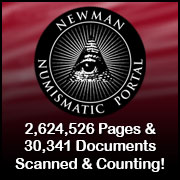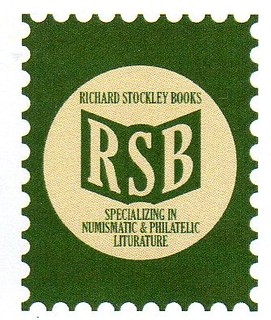
About UsThe Numismatic Bibliomania Society is a non-profit association devoted to the study and enjoyment of numismatic literature. For more information please see our web site at coinbooks.org SubscriptionsThose wishing to become new E-Sylum subscribers (or wishing to Unsubscribe) can go to the following web page link MembershipThere is a membership application available on the web site Membership Application To join, print the application and return it with your check to the address printed on the application. Print/Digital membership is $40 to addresses in the U.S., and $60 elsewhere. A digital-only membership is available for $25. For those without web access, write to: Charles Heck, Treasurer
AsylumFor Asylum mailing address changes and other membership questions, contact Chuck at this email address: treasurer@coinbooks.org SubmissionsTo submit items for publication in The E-Sylum, write to the Editor at this address: whomren@gmail.com BUY THE BOOK BEFORE THE COINSale Calendar
|
- WAYNE'S WORDS: THE E-SYLUM APRIL 26, 2020
- WARREN BAKER SALES CATALOGUES SOUGHT
- FREE BOOK: CHECKLIST OF ISLAMIC COINS, 3RD EDITION
- NEW BOOK: PAPER MONEY OF SAXONY 1772 - 1945
- AUCKLAND SOCIETY LOSES TWO STALWARTS
- GILROY ROBERTS SKETCHES A COIN PRESS
- WHITMAN JUNE 2020 BALTIMORE COIN EXPO CANCELLED
- ANA CONSOLIDATES STAFF POSITIONS
- SOME PANDEMIC HISTORY
- COINS AS TALISMANS: SAINT GEORGE'S DAY
- CORONAVIRUS UPDATES: APRIL 26, 2020
- NOTES FROM E-SYLUM READERS: APRIL 26, 2020
- VOCABULARY TERM: MEDAL
- JAMES KERSEL CRANSTON (1856-1916)
- HARVEY STACK'S NUMISMATIC FAMILY, PART 68
- SUBSCRIBER PROFILE: PAUL WITHERS
- TELL US ABOUT YOUR NUMISMATIC LIBRARY
- ALBUM MAY 2020 E-AUCTION 7 ANNOUNCED
- SEDWICK MAY 2020 AUCTION 27 SELECTIONS
- FEISEL MAY 2020 TOKEN SALE SELECTIONS
- A TETRADRACHM OF QUIETUS
- HERITAGE TO SELL SALVATION ARMY ANCIENT GOLD
- 1694 CAROLINA ELEPHANT TOKEN
- TURKEY AWARDS MEDAL OF INDEPENDENCE
- COPPER HALL OF OSHKOSH, WISCONSIN
- LOOSE CHANGE: APRIL 26, 2020
- LEPER COLONY CURRENCY
- BAR PAYS EMPLOYEES WITH SOUVENIR BANKNOTES
- FEATURED WEB SITE: FAKE BULLION DATABASE
Click here to access the complete archive
Click here to unsubscribe (scroll down)
To comment or submit articles, reply to whomren@gmail.com
Content presented in The E-Sylum is not necessarily researched or independently fact-checked, and views expressed do not necessarily represent those of the Numismatic Bibliomania Society.
WAYNE'S WORDS: THE E-SYLUM APRIL 26, 2020
 New subscribers this week include: Dan Trollan, courtesy of Jim Neiswinter; Walther Ellis, Timothy Fallon, and Scott Ichniowski. Welcome aboard! We now have 6,118
subscribers.
New subscribers this week include: Dan Trollan, courtesy of Jim Neiswinter; Walther Ellis, Timothy Fallon, and Scott Ichniowski. Welcome aboard! We now have 6,118
subscribers.
Thank you for reading The E-Sylum. If you enjoy it, please send me the email addresses of friends you think may enjoy it as well and I'll send them a subscription (but let me know if they are located in the European Union). Contact me at whomren@gmail.com anytime regarding your subscription, or questions, comments or suggestions about our content.
This week we open with a request from numismatic literature dealer Howard Engel, one new book, two obituaries, and an update from the Newman Numismatic Portal.
Other topics this week include Gilroy Roberts, Paul and Bente Withers, coin show cancellations, ANA news, pandemic history, selections from multiple numismatic auctions, the Carolina elephant token, Leper currency, and the copper hall of Oshkosh.
To learn more about Islamic coins, the paper money of Saxony, Bills of Mortality, coins as talismans, the Mansfeld thaler, corona choices, Norwegian tokens, Carl Wurtzbach, Shooting Festival medals, a Quietus tetradrachm, Turkish medals of Independence, fake bullion and a Costa Rica Countermarked Indian Cent, read on. Have a great week, everyone!
Wayne Homren
Editor, The E-Sylum
WARREN BAKER SALES CATALOGUES SOUGHT
Howard Engel of Richard Stockley Books sent out this email note this week. Can anyone help? Howard can be reached at richardstockleybooks@mymts.net . -Editor
I hope this note finds you keeping well and in good spirits in spite of the topsy-turvy world we now live in wrought by the coronavirus pandemic. I'm doing fine hunkering down at home as I keep out of mischief with my somewhat newly acquired mail-order out-of-print and antiquarian numismatic and philatelic book business (It's hard to believe, but my first anniversary as the new owner of Richard Stockley Books is fast approaching on April 29!) If nothing else I've gained a whole new appreciation for all those heroes in our midst keeping us safe and sound as they put their lives on the line for providing us with those essential services from health care and communication to finances, groceries and refuse pickup.
I have at least a couple of customers who have asked me for those imitable, highly informative, insightful and readable Warren Baker sales catalogues. If any of you have any spares that you may be willing to part with for a reasonable price I would be most grateful. I would be interested in any issue and multiple copies as I have virtually none in stock. Please let me know at your earliest convenience.
FYI, whether or not the RCNA Convention in Halifax will still indeed be held as scheduled on July 22-25 where I plan to have a dealer table, I still intend to do my buying tour from Winnipeg to New Brunswick once the travel restrictions have been lifted, even if this is not until the fall. I already have stops in Toronto and Montreal on the way there and Ottawa on the way back. Let me know if you'd like me to swing by your area as I'll also have some interesting material from advanced collectors in tow for sale. In the meantime, please do not hesitate to contact me with your own want and/or sell lists. As my slogan says, I'm "always looking to buy, sell or trade good material."
Thanks for your consideration.
Yours in numismatic literature, Howard
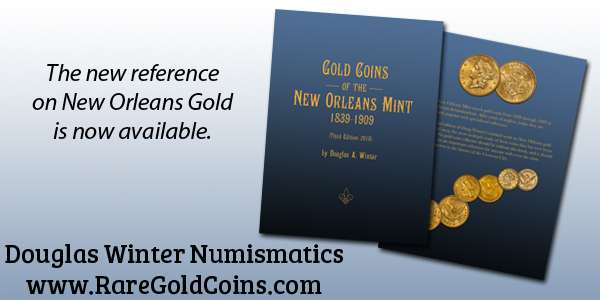
FREE BOOK: CHECKLIST OF ISLAMIC COINS, 3RD EDITION
The good folks at Stephen Album Rare Coins are making Stephen's Checklist available free on their web site. Thanks! -Editor
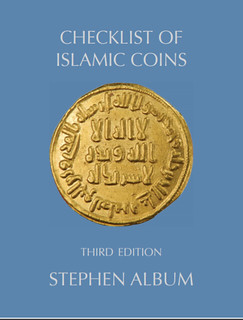 We are happy to announce that we have decided to make Stephen Album's Checklist of Islamic Coins, 3rd Edition (2011) available as a free PDF download from our
website. We hope that many of you will find this to be a useful resource during these difficult times, and in your future research and collecting.
We are happy to announce that we have decided to make Stephen Album's Checklist of Islamic Coins, 3rd Edition (2011) available as a free PDF download from our
website. We hope that many of you will find this to be a useful resource during these difficult times, and in your future research and collecting.
The book's Introduction provides a great background on how it (and the firm) came to be. -Editor
Collectors of Islamic coins have long bemoaned the lack of general literature on the subject. In particular, there has never been a general listing of Islamic coin types that could serve as a convenient guide to what exists, what is readily collectible, and what is rare. For that reason, it occurred to me back in 1992 to compile just such a listing, which could be made available to collectors and dealers at a nominal cost. In order to keep the cost to a minimum, the first edition (1993) was without illustrations, inexpensively printed from laser output, and held together by saddle-stitch binding. At first I had intended that the second edition (completed in 1997, published in 1998) would include photographs of perhaps 800-1000 coins, but after reconsideration, I decided to issue the second edition without photos and prepare a separate photo supplement that hopefully will be published within six months after the second edition of the text. In this manner I could limit the cost of the text volume, and allow those who wish to have the photo supplement to order it as a separate publication.
Alas, my intention to complete the photo volume quickly vanished. At the end of 1997 I left for Oxford, England, where I worked as a researcher and part-time lecturer at the Ashmolean Museum, associated with Oxford University, where I stayed until the middle of 2000, although I periodically came back to California to devote about two weeks each time to my coin business. Upon the conclusion of my Oxford sojourn I concentrated on the long process of resuscitating the business. Doug Nicol had left in 1999 to return to Pennsylvania and establish his own trade in genealogy. In 2001, Joseph Lang, then searching for a job in the numismatic trade, convinced me to hire him. His contribution proved so successful that in 2004 we reorganized the business as a joint partnership between us, as it remains to this day.
As these years rolled by, it seemed logical that I should abandon the idea of a photo supplement and commit my time to a third edition, complete with photos. Although my original intention was to complete the work in 2004 or 2005, postponement became the rule of law. Finally, early in 2008 I committed myself to finishing the job, hopefully by end of 2008, but delay after delay entered the picture. At last, I finalized the descriptive text on 27 July 2009, and hope to have the introduction finished within a few weeks and a PDF version (without photos) posted online in September. Most of the photos have been completed, but I will wait for about another nine months before the hardcover printed and illustrated edition will appear. As for the PDF version, it remains uncertain whether that might become available, and if so, when.
The first edition of this Checklist was intended as a convenient record of Islamic coin types, within the geometric and chronological criteria described below, together with a subjective estimation of the rarity of each type. This second edition added further information, including, for each dynasty or sub-dynasty, an indication of the most frequently encountered mints and subtypes, as well as general information on quality of strike and average preservation. Metrological data were generally not provided, except where deemed essential for the classification of types. Like the first edition, the second edition was intended especially for the beginner and the more advanced general collector, but not for the specialist, who needs detail far beyond what can be included in a synoptic guide. But for the general collector, the Checklist could serve as a basic framework from which he or she can construct parameters for assembling a collection. It should also constitute a useful reference for dealers.
For the third edition, I have greatly expanded the descriptive information for individual types and subtypes, aspiring to present more details that might help the reader identify their coins. When the printed illustrated volume becomes available, there will be more than 1000 illustrated coins. Fortunately, the internet is now providing thousands more photos, over 32,000 at www.zeno.ru.
The author and manager of that superb website, Vladimir Belyaev, has applied my appropriate Checklist number to most of the photos, and I am immensely thankful for his efforts.
For more information on the book and its previous editions, see:
A Checklist of Islamic Coins (https://db.stevealbum.com/php/albumcat.php)
To read the complete book, see:
https://www.stevealbum.com/pdfs/ChecklistOfIslamicCoins3rdEdition2011Free.pdf
NEW BOOK: PAPER MONEY OF SAXONY 1772 - 1945
Here's a Google-translated description of a Geldscheine Online newsletter article by Hans-Ludwig Grabowski on a new book on the paper money of Saxony. Article found via the SPMC News & Notes newsletter (Volume V, Number 44, April 21, 2020). -Editor
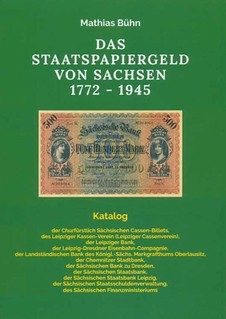 The State Paper Money of Saxony 1772 - 1945
The State Paper Money of Saxony 1772 - 1945
Mathias Bühn
48 pages, illustrated in full color, format 210 mm x 296 mm, brochure, Dresden 2020, without ISBN, price: 18.00 euros
Mathias Bühn is an extremely committed collector from Dresden, who has been working on the cataloging of Saxon paper money (including emergency money) for around twenty years.
As a preprint of the forthcoming Mammut work with around 2000 book pages, a brochure about the state paper money of Saxony was published in a very limited and almost sold-out edition.
48 pages, illustrated in full color, format 210 mm x 296 mm, brochure, Dresden 2020, without ISBN, price: 18.00 euros
The very detailed subtitle describes what the catalog lists in terms of issuers: "Catalog of the Churfürstlich-Sächsische Cassen-Billets, the Leipziger Kassen-Verein (Leipziger Cassenverein), the Leipziger Bank, the Leipzig-Dresdner Eisenbahn-Compagnie, the Landesstandsische Bank des Könihl.-Sächs. Markgrafthums Oberlausitz, the Chemnitzer Stadtbank, the Sächsische Bank zu Dresden, the Sächsische Staatsbank, the Sächsische Staatsbank Leipzig, the Sächsische Staatsschulverwaltung, the Sächsischen Finanzministerium".
Simply put, all forms of Saxon banknotes and state paper money are listed, starting with the Churfürstlich Sächsische Cassen-Billets from 1772 to the emergency expenditure of the Sächsische Staatsbank at the end of the Second World War.
The author lists the variants in detail, e.g. even the signature variants for the Cassen billets and various no signs, plungers and numerators as well as known and likely series.
From a technical point of view, it provides the best cataloging on this topic to date. The assessments were made in three degrees of maintenance in euros.
The preprint makes curious about the entire Saxon paper money catalog, which will also be illustrated in full color. Experienced collectors know that Saxony was the country with the most emergency money expenditure in Germany during the inflation period. The meticulous work on this topic, which has been going on for over two decades, cannot therefore be overestimated.
To read the complete article, see:
Mathias Bühn: Das Staatspapiergeld von Sachsen 1772 – 1945
(https://www.geldscheine-online.com/post/mathias-b%C3%BChn-das-staatspapiergeld-von-sachsen-1772-1945)
To subscribe to Geldscheine Online, see:
Newsletter-Anmeldung – Keine Neuigkeiten verpassen!
(https://www.geldscheine-online.com/newsletter-anmeldung)
To read News & Notes, see:
https://www.spmc.org/news-and-notes
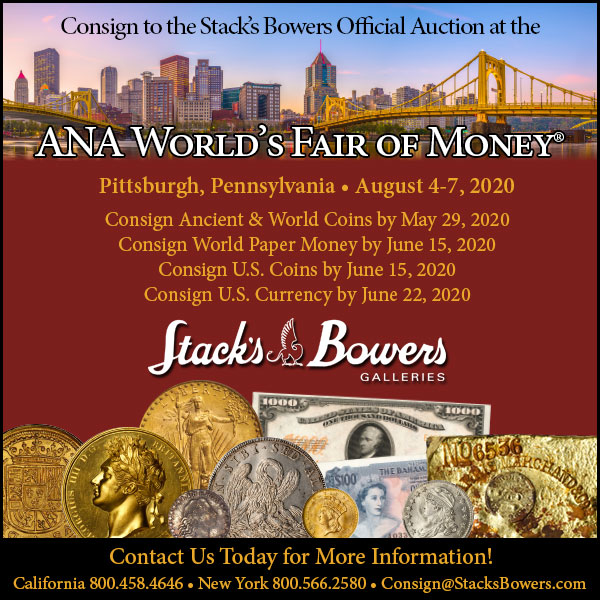
AUCKLAND SOCIETY LOSES TWO STALWARTS
Jim Duncan of the Numismatic Society of Auckland passed along these remembrances of two of the club's stalwart members. Thanks. Sorry to hear the news. -Editor
NUMISMATIC SOCIETY OF AUCKLAND LOSES TWO STALWARTS IN A MONTH
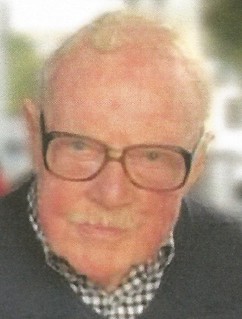 Wallace Frederick Ryan was a quiet, reserved member of the Society almost since its inception in 1959. He worked for the Auckland Savings Bank and spent many
years relieving in branches before being placed at head office. After he retired he was able to enjoy some of the finer things in life – good wine, nice coins, good opera and good
music. He had a preference for Russian and Great Britain's coins, but if you got into conversation with him you found he was well travelled – he even spent time in Beaune, France,
where they hold wine auctions
Wallace Frederick Ryan was a quiet, reserved member of the Society almost since its inception in 1959. He worked for the Auckland Savings Bank and spent many
years relieving in branches before being placed at head office. After he retired he was able to enjoy some of the finer things in life – good wine, nice coins, good opera and good
music. He had a preference for Russian and Great Britain's coins, but if you got into conversation with him you found he was well travelled – he even spent time in Beaune, France,
where they hold wine auctions
He didn't show for our February meeting, and we found that he had died at home alone between the 7th and the 14th February. His long service to the Society had been recognised with an Honorary Membership, marking especially his 24 years as the Society's Treasurer.
It came as a shock to all who him. Wal, as he was known, had not kept the best of health, and had a pacemaker fitted in December. This was checked in February and declared okay, but he appears to have died shortly after this check. The 11th of February is his probable date of passing.
The Society has been left a generous legacy from this retiring member, and we feel that he may have viewed the Society as the family he did not have. Thank you Wallace.
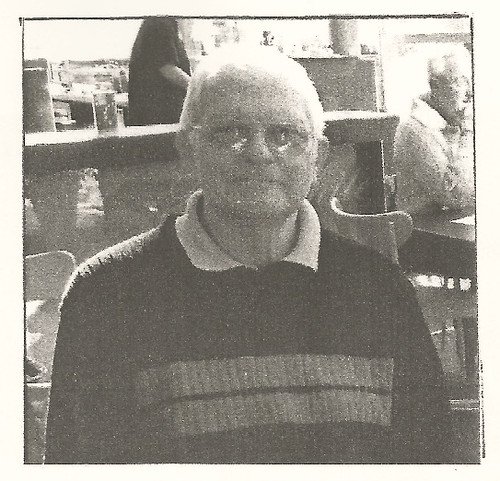 Within a month John C.M. Creswell also passed away. John was a Kiwi but lived south of Brisbane, Australia. He was a vigorous proponent of the Society before it
was formed, and held various posts including President. He had the ambition to create an Encyclopaedia of New Zealand Numismatics, to which end I photographed many of his
scarcer medals, but, alas, it did not come to fruition. John was always busy though, he was half of the "John Bertrand" brand of albums for pre-decimal coins, and catalogues. He
also produced a book on New Zealand Numismatics. But he produced many other booklets on the historical aspect of New Zealand's East Coast, where he was born.
Within a month John C.M. Creswell also passed away. John was a Kiwi but lived south of Brisbane, Australia. He was a vigorous proponent of the Society before it
was formed, and held various posts including President. He had the ambition to create an Encyclopaedia of New Zealand Numismatics, to which end I photographed many of his
scarcer medals, but, alas, it did not come to fruition. John was always busy though, he was half of the "John Bertrand" brand of albums for pre-decimal coins, and catalogues. He
also produced a book on New Zealand Numismatics. But he produced many other booklets on the historical aspect of New Zealand's East Coast, where he was born.
John always had something on the go, usually several things at a time – a complete set of New Zealand Maori War Medals, a book about Auckland's MoTaT, books about various notables and notable places on the East Coast, Collecting Coins and Medals, Maori Meeting Houses of the North Island, Maori Guides at Rotorua, Fire Brigade Medals and a joint effort with this author to create "Anton Teutenberg – a Master Engraver and His Work" – John wrote most of the words, I took most of the photographs. John had the foresight to visit the old Teutenberg homestead in Mt Roskill and with permission had sifted through the 6 inches of sawdust on the floor of the workshop – hard going but worthwhile! And there are many more titles which I don't have a record of to his credit.
His move to Australia simply gave him a bigger canvas to draw from, and he worked both countries as a tour bus driver. Latterly he had become interested in Indian fiscal stamps and in Native State rupee coins.
He had survived a cancer attack maybe 30 years ago, but the devil returned for a second try and on 9 March, aged 87, he passed away, leaving his wife Nanette and Vicki, Guy and Linda and their families to whom we extend our deepest sympathies.
For more information on the Numismatic Society of Auckland, see:
https://www.rnsnz.org.nz/collector-info/clubs/numismatic-society-of-auckland/
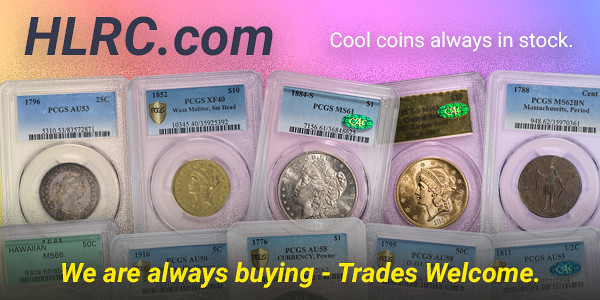
GILROY ROBERTS SKETCHES A COIN PRESS
The latest addition to the Newman Numismatic Portal is research material for the classic book The Fantastic 1804 Dollar. Project Coordinator Len Augsburger provided the following report. -Editor
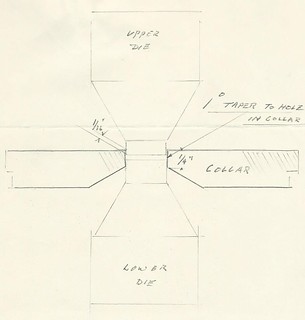 Currently in processing at Newman Portal is a correspondence group related to Eric P. Newman and Ken Bressett's The Fantastic 1804 Dollar. Among the
correspondents was Gilroy Roberts, then chief engraver of the U.S. Mint (1948-1964). The Roberts file begins in late 1959, as Newman is trying to understand the precise
relationship between the planchet, press, and collar as it might have been when the 1804 dollars were struck.
Currently in processing at Newman Portal is a correspondence group related to Eric P. Newman and Ken Bressett's The Fantastic 1804 Dollar. Among the
correspondents was Gilroy Roberts, then chief engraver of the U.S. Mint (1948-1964). The Roberts file begins in late 1959, as Newman is trying to understand the precise
relationship between the planchet, press, and collar as it might have been when the 1804 dollars were struck.
Newman asks numerous, detailed questions with respect to upsetting blanks, border beading, edge lettering, and one-piece vs. split collars. Roberts included a sketch to demonstrate the depth of the collars currently in use, in response to Newman's query regarding how the dies enter the collar and to what extent. Newman used this information in chapter 4 of Fantastic ("Changes in Coin Production Methods After 1804"), with the table on page 33, for example, drawn from the Roberts correspondence.
Image: Gilroy Robert's sketch, October 20, 1961
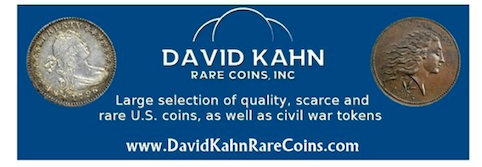
WHITMAN JUNE 2020 BALTIMORE COIN EXPO CANCELLED
I'm sure most readers have seen this news by now, but here are the press releases on the cancellation of the June 2020 Whitman Coin Expo and the relocation of the associated Stack's Bowers auctions. -Editor
Whitman Coin & Collectibles Expo Cancels June Bourse, Plans to Reopen in November
Ongoing Public Health Crisis Has Restricted the Baltimore Convention Center
Stack's Bowers Galleries' Official Auction of the Whitman Coin & Collectibles Expo, Will Hold its Auction in California.
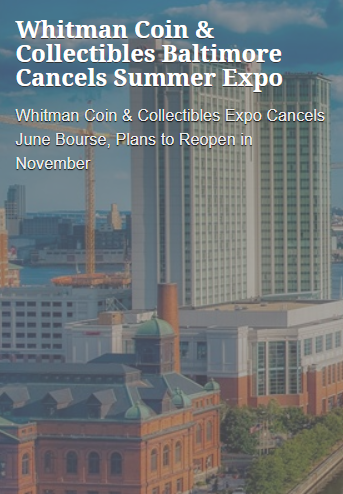 Maryland's ongoing state of emergency, declared March 12 by Governor Larry Hogan to help control the COVID-19 coronavirus pandemic, has closed the June 2020 Whitman Coin
& Collectibles Expo bourse. The Expo, originally scheduled for June 18–20 at the Baltimore Convention Center, will be closed for all bourse activities including dealer buying
and selling, educational programs, and club meetings. The auction of Stack's Bowers Galleries will be held on the previously announced dates at its California home offices. Please
visit www.stacksbowers.com for auction details and updates.
Maryland's ongoing state of emergency, declared March 12 by Governor Larry Hogan to help control the COVID-19 coronavirus pandemic, has closed the June 2020 Whitman Coin
& Collectibles Expo bourse. The Expo, originally scheduled for June 18–20 at the Baltimore Convention Center, will be closed for all bourse activities including dealer buying
and selling, educational programs, and club meetings. The auction of Stack's Bowers Galleries will be held on the previously announced dates at its California home offices. Please
visit www.stacksbowers.com for auction details and updates.
Part of Maryland's containment strategies include restricting public access to state buildings and controlling public events.
Management and staff of the Whitman Coin & Collectibles Expo continue to express their concern for everyone affected by COVID-19. "Social distancing is a crucial part of Maryland's strategy for flattening the hospital-capacity curve," said Whitman Expo general manager Lori Kraft. "The state continues to monitor the pandemic. We're grateful for front-line medical workers, and we understand the need to cooperate so everyone stays as safe as possible. Our dealers and the hobby community are looking forward to getting back to business, and we anticipate an even busier and better Expo in November."
A complete roster of bourse activities will run throughout the November 12–14 Expo. "We have some exciting announcements in the works, some of the greatest names in the hobby will be there, and everyone will be ready to jump back into a booming market after energy has been building for a few months," said Kraft.
Updates and news regarding the Whitman Baltimore Expo will be posted at expo.whitman.com.
Here's the Stack's Bowers announcement. -Editor
Covid-19 Virus Forces Relocation of the Stack's Bowers Galleries Official Auction of the Whitman Coin & Collectibles June Expo
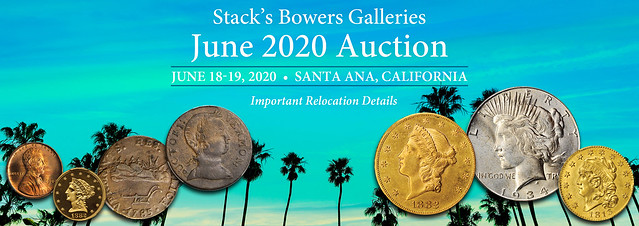
Stack's Bowers Galleries' June 2020 Auction has been relocated from the Baltimore Convention Center to their Santa Ana, California home office. Lot viewing for the auction will be held by appointment at the California office starting June 8.
"As the world closely monitors the impact of the Covid-19 virus and the resulting cancellation of numerous public events, we have made the strategic decision to host our June auction in our home offices in the same manner as we recently conducted our record setting March event," said Brian Kendrella, president of Stack's Bowers Galleries. He continued: "Our superb online bidding software will once again carry the load, as is the norm in today's auction world. Numismatic sales have remained strong and our March sale exceeded presale estimates, which were determined well before recent economic difficulties. With over $38 million in numismatic items sold in our March auctions, many at new world record prices, Stack's Bowers Galleries has demonstrated a superior ability to connect bidders with desirable coins and achieve tremendous prices realized for our consignors, even in the face of unanticipated global uncertainty."
Showcased in June will be the Q. David Bowers Collection of Vermont Coppers, a highly significant offering, remarkable both for the exceptional quality of individual pieces and the presence of numerous rare varieties. Also featured will be a stunning collection of gold coins from The Francesca Collection, a cabinet that is coming to market after being in private hands for nearly 50 years. In addition, we will have a beautiful selection of silver coinage from The Dazzling Rarities Collection that will delight collectors in many series.
Stack's Bowers Galleries is still accepting consignments for the June 2020 Auction and generous cash advances are available. For more information please inquire by phone (800-458-4646) or by email at consign@stacksbowers.com.
For clients unable to attend the live auction in California, please call 800-458-4646 or email info@stacksbowers.com to request phone descriptions from the firm's specialists, to place absentee bids, or to arrange bidding by telephone. Live bidding will be available through the company's website at www.StacksBowers.com or through their iOS and Android apps using technology recognized as the best in its class by the Numismatic Literary Guild.

ANA CONSOLIDATES STAFF POSITIONS
In other news, here's a press release from the ANA about the organization's consolidation of staff positions in light of reduced revenues. -Editor
American Numismatic Association Consolidates Staff Responsibilities
The American Numismatic Association (ANA) eliminated several staff positions this week as a response to COVID-19 and the resulting suspension of several programs.
"Yesterday, I had the sad task of having to bid farewell to four of our team members working in areas of club outreach, facilities, library and seminar/events," says ANA Executive Director Kim Kiick.
"The ANA has been using significant sums from our reserves to support operating expenditures," says Kiick. "Our operating deficit has been further exacerbated by the COVID-19 pandemic and the resulting suspension of several programs. I have found it necessary to identify savings wherever possible, which includes eliminating several positions tied to programs that are currently inactive."
The responsibilities held by those individuals released from employment will be dispersed among existing staff, according to Kiick. Logan Curtis will be the primary contact for ANA clubs and district representatives with support from the membership team; Curtis also will continue in her role as conventions coordinator. Sam Joseph will take the lead on facilities coordination while also fulfilling his expo manager responsibilities. Brianna Victor, seminars manager, will be taking a lead role on virtual education programming, working closely with the ANA IT Committee, led by Chairman Rob Oberth.
COVID-19 forced the closure in March of the Edward C. Rochette Money Museum and the Dwight N. Manley Library, while also compelling the cancellation of the ANA's Summer Seminar – the first time the event has been cancelled in its 50-plus year history. The museum and library will remain closed through May 31; the ANA headquarters offices will begin a phased re-opening for up to 50 percent of its employees beginning May 4, with social distancing and other safety measures strictly enforced. The remaining team will continue to work from home.
"Staff reductions are difficult for everyone," says Kiick. "Certainly it's a blow to those who have been let go, but it's hard on the entire team – more so because everyone is working from home and there is not an opportunity for a proper goodbye. But those that remain understand that our transition to a stronger, more financially-viable organization may mean that we run leaner and that our programs may look different."
I'm very sorry to hear this news. It's an inevitable consequence of events as the situation unfolds. We're all wishing and hoping for a quick return to normal, but no one really knows what's next. As noted last week, current plans are for the ANA's World's Fair of Money to take place in early August in Pittsburgh as planned. But plans these days can quickly change as we've just seen for the Whitman June show. Loss of the WFOM would be another financial hit for the ANA. -Editor
To read the earlier E-Sylum article, see:
ANA CANCELS 2020 SUMMER SEMINAR (https://www.coinbooks.org/v23/esylum_v23n15a27.html)
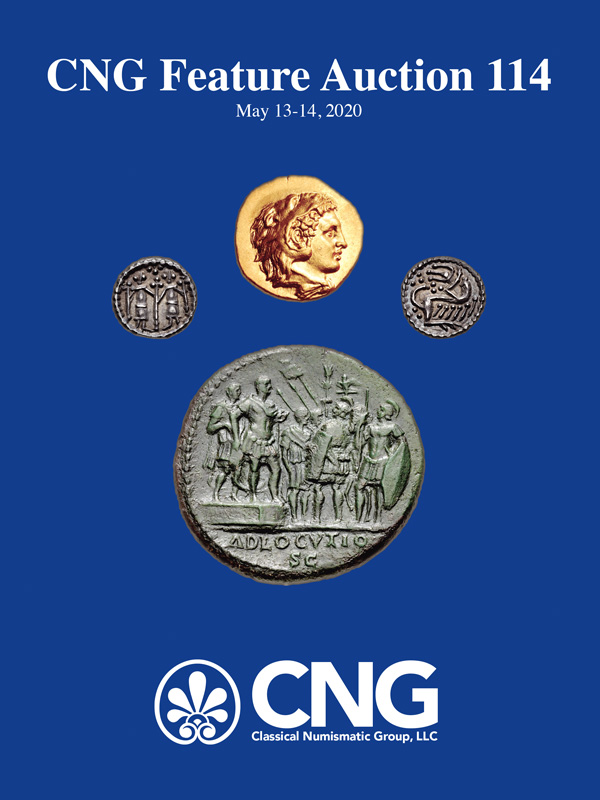
SOME PANDEMIC HISTORY
These articles I came across this week are in the non-numismatic category, but should be of general interest in these times. First, here's an excerpt from a New York Times article on the birth of social distancing. -Editor
The concept of social distancing is now intimately familiar to almost everyone. But as it first made its way through the federal bureaucracy in 2006 and 2007, it was viewed as impractical, unnecessary and politically infeasible.
"There were two words between ‘shut' and ‘up'" initially, said Dr. Howard Markel, who directs the University of Michigan's Center for the History of Medicine and who played a role in shaping the policy as a member of the Pentagon research team. "It was really ugly."
Dr. Mecher was there when Dr. Hatchett presented government public health experts the plan that the two of them and Dr. Lisa M. Koonin of the Centers for Disease Control and Prevention had reviewed over burgers and beer.
"People could not believe that the strategy would be effective or even feasible," Dr. Mecher recalled.
But within the Bush administration, they were encouraged to keep at it and follow the science. And ultimately, their arguments proved persuasive.
Good ideas can start anywhere - even with 14-year-olds. -Editor
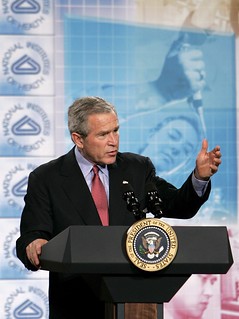 "‘Someone from the White House is on the phone,'" Dr. Mecher, then 49, recalled his secretary telling him in the fall of 2005, her voice expressing some disbelief.
"‘Someone from the White House is on the phone,'" Dr. Mecher, then 49, recalled his secretary telling him in the fall of 2005, her voice expressing some disbelief.
It was about that time that Dr. Mecher heard from Robert J. Glass, a senior scientist at Sandia in New Mexico who specialized in building advanced models to explain how complex systems work — and what can cause catastrophic failures.
Dr. Glass's daughter Laura, then 14, had done a class project in which she built a model of social networks at her Albuquerque high school, and when Dr. Glass looked at it, he was intrigued.
Students are so closely tied together — in social networks and on school buses and in classrooms — that they were a near-perfect vehicle for a contagious disease to spread.
Dr. Glass piggybacked on his daughter's work to explore with her what effect breaking up these networks would have on knocking down the disease.
The outcome of their research was startling. By closing the schools in a hypothetical town of 10,000 people, only 500 people got sick. If they remained open, half of the population would be infected.
"My God, we could use the same results she has and work from there," Dr. Glass recalled thinking. He took their preliminary data and built on it by running it through the supercomputers at Sandia, more typically used to engineer nuclear weapons. (His daughter's project was entered in the Intel International Science and Engineering Fair in 2006.)
Dr. Mecher received the results at his office in Washington and was amazed.
If cities closed their public schools, the data suggested, the spread of a disease would be significantly slowed, making this move perhaps the most important of all of the social distancing options they were considering.
To read the complete article, see:
The Untold Story of the Birth of Social Distancing
(https://www.nytimes.com/2020/04/22/us/politics/social-distancing-coronavirus.html)
Of course, social distancing itself isn't really new - just some of the science around it. Here's some historical background on the goal of "flattening the curve" from the University of Michigan. -Editor
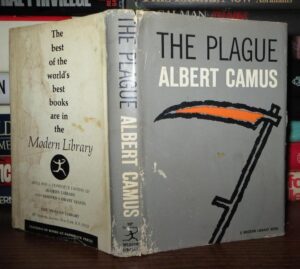 A few months earlier, the Bush administration had been seen as flat-footed in its response to Hurricane Katrina. Officials meant to be better prepared for any new
natural disaster, including an H5N1 epidemic. So they convened a task force to recommend plans — epidemiologists, virologists, bioterrorism experts, scientists from the National
Academy of Medicine, analysts from the U.S. Departments of State and Defense, and one authority on the history of medicine.
A few months earlier, the Bush administration had been seen as flat-footed in its response to Hurricane Katrina. Officials meant to be better prepared for any new
natural disaster, including an H5N1 epidemic. So they convened a task force to recommend plans — epidemiologists, virologists, bioterrorism experts, scientists from the National
Academy of Medicine, analysts from the U.S. Departments of State and Defense, and one authority on the history of medicine.
The historian was Howard Markel, director of U-M's Center for the History of Medicine. (He is both a pediatrician and the George E. Wantz Professor of the History of Medicine.)
The administration asked the task force: What should we do if the avian flu — or any other viral epidemic — gets really, really bad?
Markel, with colleagues from the U.S. Centers for Disease Control and Prevention, got to work.
First, he recruited staff — a dozen or so researchers to gather every surviving scrap of information about the United States's response to the "Great Influenza" of 1918-19, at the tail end of World War I.
They combed through every edition of the U.S. Census Bureau's Weekly Health Index for 1918-19; reports issued by city and state health departments; 86 newspapers; records of military encampments; and every published account of the pandemic they could find — more than 20,000 documents in all.
They documented activities now familiar in 2020 — school closings; bans on concerts, movies, and sporting events; efforts to isolate the sick and quarantine those who'd had contact with the sick; business closures and staggered hours; restrictions on trains, buses and trolleys; and ordinances to require face masks.
All 43 cities used non-pharmaceutical interventions. Some acted early, comprehensively, and for long periods. Other efforts were late, half-hearted, and brief.
"They didn't cure the influenza," Markel said. "It was just about buying time."
So the White House got the advice it had asked for: If a pandemic arose in the 21st century, every effort should be made to promote early, strong, and persistent non-pharmaceutical interventions in the lethal period before the production of a vaccine.
Markel has been much in demand among journalists who want to know what he thinks will happen next. He is careful to say that historians are not in the business of predicting the future. But he points to the evidence of 1918-19 for guidance.
"The key word about this coronavirus is ‘novel,'" Markel told the New Yorker recently. "We don't have any experience with COVID-19. We won't know it's over until long after it's over, so it's hard to know when to release the trigger.
"This I know," he continues. "If we release these measures too early, we're going to be back in the same situation that we were in, in terms of cases and deaths, or perhaps worse, and we will have crippled the economy and caused all this social disruption for nothing."
Markel teaches an undergraduate course on literature and medicine. Among the books he assigns is Albert Camus' The Plague, a novel set in French Algeria after World War II. In the city of Oran, rats infect humans with the bubonic plague. Officials downplay it, then dither. Panic and violence ensue, triggering martial law. When the pestilence finally subsides, the survivors are all too ready to forget their lethal folly.
To read the complete article, see:
The idea to ‘flatten the curve'
(https://michigantoday.umich.edu/2020/04/23/the-idea-to-flatten-the-curve/)
For additional timely reading, check out Daniel Defoe's 1772 A Journal of the Plague Year. -Editor
The government acted swiftly. Invoking emergency measures passed in earlier times, the mayor issued a series of orders that aggressively changed life in the city. Public events and gatherings were banned, schools were closed and the city was divided into more readily policeable quarters. Infected individuals were locked in their houses with their families and were forbidden from leaving under the penalty of death. Upstanding citizens, deputized in various capacities as searchers, examiner, and watchmen, were — under the penalty of death — tasked with overseeing this quarantine.
The city in question is not Wuhan or Milan or Manhattan. It is London and the year is 1665. Before the end of 1666, the Bubonic Plague will kill roughly one-quarter of the city's population. As devastating as this figure is, it could have been much worse.
This is one of the key takeaways from Daniel Defoe's A Journal of the Plague Year. Published in 1722, Defoe's text is technically a novel, but historians and epidemiologists have praised it as an accurate report of life in London during "the Great Plague." Defoe, who is most famous for his novel Robinson Crusoe, did live in London in 1665, but he was only five years old. In A Journal, a middle-aged narrator renders a graphic and comprehensive look at life inside a city beset with a pandemic far more terrifying than the one we face today.
To read the complete article, see:
What Can Daniel Defoe's "Plague Year" Teach Us About Coronavirus?
(https://www.insidehook.com/article/books/daniel-defoe-journal-plague-year-predicted-coronavirus)
And don't forget Samuel Pepys' first-hand accounts of life in London under the bubonic plague. -Editor
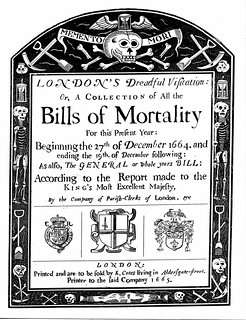 The plague first entered Pepys' consciousness enough to warrant a diary entry on April 30, 1665: "Great fears of the Sickenesse here in the City," he wrote, "it being
said that two or three houses are already shut up. God preserve us all."
The plague first entered Pepys' consciousness enough to warrant a diary entry on April 30, 1665: "Great fears of the Sickenesse here in the City," he wrote, "it being
said that two or three houses are already shut up. God preserve us all."
Pepys continued to live his life normally until the beginning of June, when, for the first time, he saw houses "shut up" – the term his contemporaries used for quarantine – with his own eyes, "marked with a red cross upon the doors, and ‘Lord have mercy upon us' writ there." After this, Pepys became increasingly troubled by the outbreak.
He soon observed corpses being taken to their burial in the streets, and a number of his acquaintances died, including his own physician.
By mid-August, he had drawn up his will, writing, "that I shall be in much better state of soul, I hope, if it should please the Lord to call me away this sickly time." Later that month, he wrote of deserted streets; the pedestrians he encountered were "walking like people that had taken leave of the world."
To read the complete article, see:
Diary of Samuel Pepys shows how life under the
bubonic plague mirrored today's pandemic (https://theconversation.com/diary-of-samuel-pepys-shows-how-life-under-the-bubonic-plague-mirrored-todays-pandemic-136222)
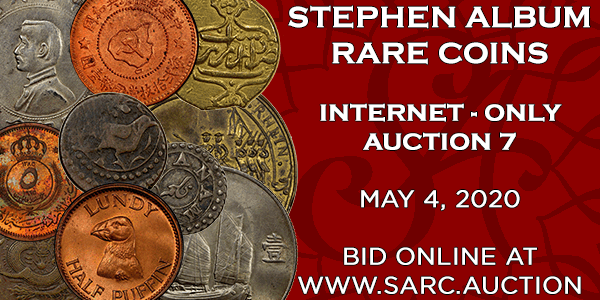
COINS AS TALISMANS: SAINT GEORGE'S DAY
David Pickup submitted this article on St. George and the dragon, and coins as talismans. Thanks! -Editor
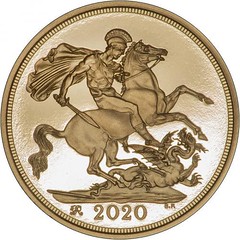 Continuing the series on coins and health, here is how coins can save your life. It was St George's Day this week on Thursday. We do not really go in for a national day
in England. Other countries have a party on their special day. Usually they are celebrating independence from us. George is the patron saint of England and the day was treated as
any other day. In fact someone wished me Happy Saint David's Day! Stop someone in the street and ask who the national patron saint is and they would probably call the police for
breach of social inclusion but not many would answer correctly. George was not English or British and never visited this country. He was not a knight but probably a Roman soldier.
He was born in what is now Turkey and lived in Israel. Probably the knights on crusade liked to hear about him and brought stories back home. He is the patron of many countries in
Europe.
Continuing the series on coins and health, here is how coins can save your life. It was St George's Day this week on Thursday. We do not really go in for a national day
in England. Other countries have a party on their special day. Usually they are celebrating independence from us. George is the patron saint of England and the day was treated as
any other day. In fact someone wished me Happy Saint David's Day! Stop someone in the street and ask who the national patron saint is and they would probably call the police for
breach of social inclusion but not many would answer correctly. George was not English or British and never visited this country. He was not a knight but probably a Roman soldier.
He was born in what is now Turkey and lived in Israel. Probably the knights on crusade liked to hear about him and brought stories back home. He is the patron of many countries in
Europe.
A long time ago a knight called George lived near a hill in what is now Germany. The hill was home to a dragon who seemed to be a bit of a nuisance and the locals had to supply the monster with a fresh virgin to quieten him. Unfortunately they ran out of virgins (no comment) and the dragon wanted the king's daughter. I do not know about her reputation but the knight called George save her by killing the dragon. Henceforth the city which was called Mansfeld chose Saint George as its patron.
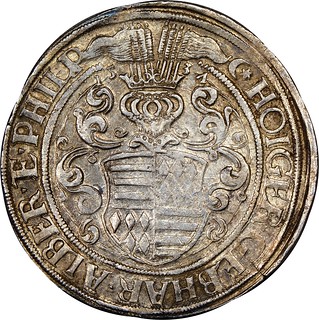
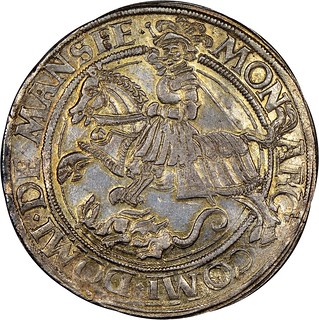
German States MANSFELD Thaler from the NGC World Coin Price Guide
The German city of Mansfeld started issuing talers with a picture of the family's patron saint killing a dragon. They were first minted in 1521. In the Seventeenth Century coins bearing the image of St. George were carried by soldiers as a protection against injury. An imperial officer was said to have been shot in battle, but saved from injury by a Mansfeld taler he carried. In the Years' War and wars with the Turks, many officers and ordinary soldiers wore these thalers. A colonel of the Sachsen family, von Lisbau was twice saved by a Mansfeld thaler sewn into his clothing. The talers changed hands for up to ten times the value. The demand was so great and some cheaper medallions were manufactured. Saint George and the dragon is a popular coin design of course. Probably the design used on crowns and sovereigns by Benedetto Pistrucci is the best known.
So a belated happy Saint George's Day to one and all, watch out for dragons and keep safe.
Here's a lot from the 2020 New York Sale with a nice description of how well Pistrucci was regarded. -Editor
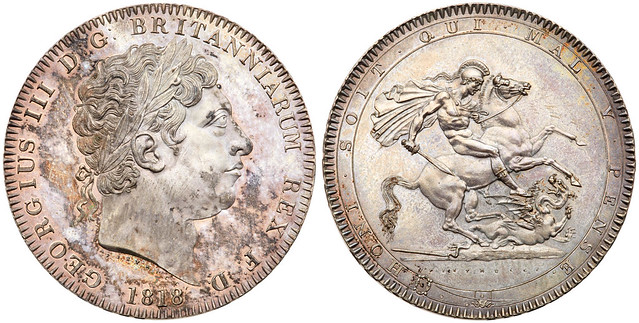
Perhaps the favourite coin of William Wellesley Pole the Master of the Mint at this time and older brother of the Duke of Wellington, the silver Crowns engraved by Italian engraver Benedetto Pistrucci were released with a glowing sense of pride in that Pole ordered that each piece was wrapped in tissue paper before being sent out to the banks for circulation. Considered as a piece of numismatic art by Pole who had made the sometime fiery Pistrucci the Chief Engraver in all but name as an Italian could not hold such an office in the Royal Mint officially at that time, the name of the engraver features prominently in full on both sides of the coin.
The Latin legend translate as on the obverse "George the Third, by the grace of God, King of the Britons, Defender of the Faith" and the French on the reverse, "Evil to him who evil thinks," additionally on the edge "An ornament and a safeguard, in the 58th year of the reign".
To read the complete article, see:
Great Britain George III (1760-1820), Silver Crown of Five Shillings, 1818 LVIII.
(https://www.numisbids.com/n.php?p=lot&sid=3606&lot=1266)
To read the earlier E-Sylum articles, see:
GERMS AND MONEY (https://www.coinbooks.org/v23/esylum_v23n14a35.html)
COINS AND HEALTH (https://www.coinbooks.org/v23/esylum_v23n15a39.html)
COINS AND POISON (https://www.coinbooks.org/v23/esylum_v23n16a17.html)
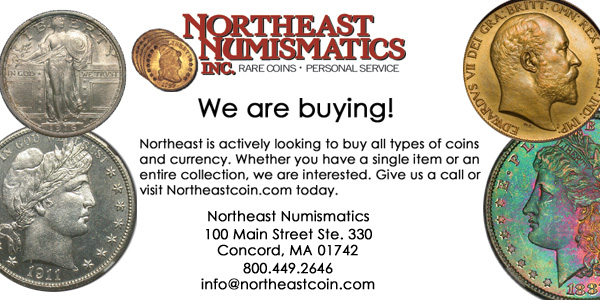
CORONAVIRUS UPDATES: APRIL 26, 2020
The E-Sylum in These Trying Times
Dennis Forgue writes:
"The E-Sylum has become a very important connection to the numismatic community in these trying times. Many thanks for your efforts."
You're welcome. It remains fun to put this together each week; there's always something interesting to discuss. These updates are getting shorter as predicted as everyone settles into the middle of this event. Going forward I hope to gradually see more notices of businesses and clubs reopening.
Meanwhile, here's a meme shared by John Regitko... -Editor

United States Mint (April 20, 2020)
 "The United States Mint (Mint) will resume limited production Tuesday morning, April 21st at the Mint facility at West Point. During the temporary suspension of
operations at the West Point Mint, in consultation with local public health officials, a thorough cleaning of the facility was conducted in accordance with Centers for Disease
Control and Prevention (CDC) guidelines. Additional social distancing procedures were implemented, building on measures previously taken to reduce the risk of employee exposure to
COVID-19. Mint employees at West Point have been designated mission-essential."
"The United States Mint (Mint) will resume limited production Tuesday morning, April 21st at the Mint facility at West Point. During the temporary suspension of
operations at the West Point Mint, in consultation with local public health officials, a thorough cleaning of the facility was conducted in accordance with Centers for Disease
Control and Prevention (CDC) guidelines. Additional social distancing procedures were implemented, building on measures previously taken to reduce the risk of employee exposure to
COVID-19. Mint employees at West Point have been designated mission-essential."
Sotheby's (April 23, 2020)
From CNN:
 "Despite shuttering outposts around the world and furloughing staff due to the coronavirus pandemic, Sotheby's has just pulled off its biggest ever online art
auction.
"Despite shuttering outposts around the world and furloughing staff due to the coronavirus pandemic, Sotheby's has just pulled off its biggest ever online art
auction.
"Featuring work by the likes of Andy Warhol and Damien Hirst, the "Contemporary Curated" sale generated more than $6.4 million -- a new online record for the auction house.
"The sale also set a new record for the highest price ever paid via the internet for a painting at Sotheby's, with American artist George Condo's "Antipodal Reunion" going to an unidentified bidder for $1.3 million. The 2005 artwork exceeded estimates following a series "quick-fire" bids at the end of the week-long web auction, according to a press release.
"{Earlier in April, the Wall Street Journal reported that Sotheby's was furloughing around 200 staff, or nearly 12% of its employees, after it was forced to cancel numerous scheduled sales. Although the auction house did not comment on the specific numbers reported, it said in a statement to CNN that it was "adjusting to the challenging circumstances" and had "considered every avenue including temporary compensation adjustments (including our leadership), furloughs and, regrettably, a small number of staff reductions."
To read the complete article, see:
Sotheby's sets new online auction record despite coronavirus gloom
(https://www.cnn.com/style/article/sothebys-online-sales-record/index.html)
Fritz Rudolf Künker (April 24, 2020)
 "Our Osnabrück branch has already reopened, and our Munich office will reopen its doors next Monday. If you would like to visit us -- for example, to buy or sell
investment gold, or to consign coins for auction -- please contact our Customer Service department in Osnabrück or our Munich colleagues. They will be happy to arrange an
appointment with one of our employees.
"Our Osnabrück branch has already reopened, and our Munich office will reopen its doors next Monday. If you would like to visit us -- for example, to buy or sell
investment gold, or to consign coins for auction -- please contact our Customer Service department in Osnabrück or our Munich colleagues. They will be happy to arrange an
appointment with one of our employees.
"We ask for your understanding that an appointment is absolutely necessary. Our employees are of course prepared to ensure that hygiene and distance rules are observed during your visit. Disinfectants and masks are also available in sufficient quantities. "
Analyzing Recent Auction Prices (April 26. 2020)
E-Sylum supporter Ron Guth published a blog article this week analyzing a random sample of recent numismatic auction results. Here's an excerpt, but be sure to read the complete article online. -Editor
 Analyzing Auction Prices Realized (APR's) for publicity purposes involves a certain amount of bias. Because it is impossible or undesirable to analyze every lot in a
particular sale, choices must be made as to which coins to analyze. For instance, numismatic publications may be biased toward the headline-generating "trophy" coins, record
prices, super-rarities, etc. Auction houses tend to present coins that showcase their success in getting the most money for their consignors. Specialists may focus on a particular
series where they possess expert knowledge. As a result, biased analyses may end up presenting differing accounts of the same auction.
Analyzing Auction Prices Realized (APR's) for publicity purposes involves a certain amount of bias. Because it is impossible or undesirable to analyze every lot in a
particular sale, choices must be made as to which coins to analyze. For instance, numismatic publications may be biased toward the headline-generating "trophy" coins, record
prices, super-rarities, etc. Auction houses tend to present coins that showcase their success in getting the most money for their consignors. Specialists may focus on a particular
series where they possess expert knowledge. As a result, biased analyses may end up presenting differing accounts of the same auction.
How different would the analyses look if bias could be eliminated by choosing the coins at random? Of what benefit would that be? Currently, there is a fear that the coin market may be declining precipitously along with the stock market, businesses, and the overall economy as a result of the COVID-19 pandemic. To answer that fear, a biased analyst could pick and choose coins to show that the market has actually risen, thus giving comfort to anxious collectors and dealers. Alternatively, another biased analyst could pick and choose coins from the same sale to show a completely opposite picture, thus stoking the fear even further. A random, bias-free sampling of coins should give a more realistic view of the results of an auction.
To test this concept, the Numismatic Detective Agency (NDA) examined fifteen lots from Heritage Auctions' Central States sale conducted on April 23-24, 2020.
To read the complete article, see:
Random Sampling – A Different Approach to Numismatic APR's
(https://numismaticdetectives.com/blog/f/random-sampling-%E2%80%93-a-different-approach-to-apr%E2%80%99s)
Three Two-Corona Choices
Ron Haller-Williams writes:
"I think I know what I'd prefer, out of:
• 4 half-corona cigars
• 2 corona viruses
• an Austro-Hungarian 2 corona of 1892-1918
even though the maths might suggest some sort of equality."
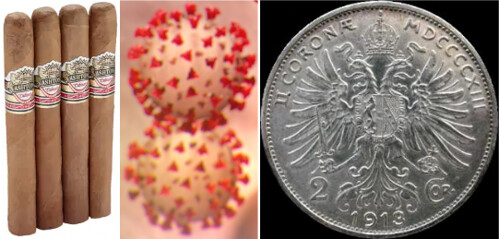
Me, too. But I still like Rich Jewell's option. -Editor
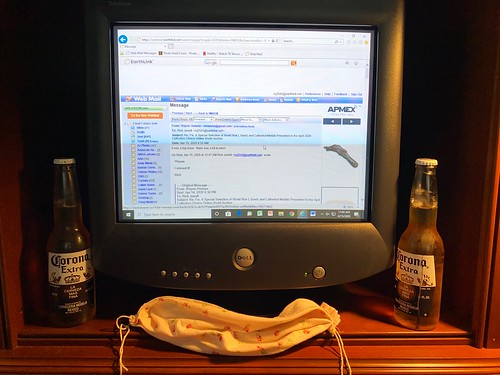
To read the earlier E-Sylum article, see:
CORONAVIRUS UPDATES: APRIL 19, 2020 (https://www.coinbooks.org/v23/esylum_v23n16a11.html)
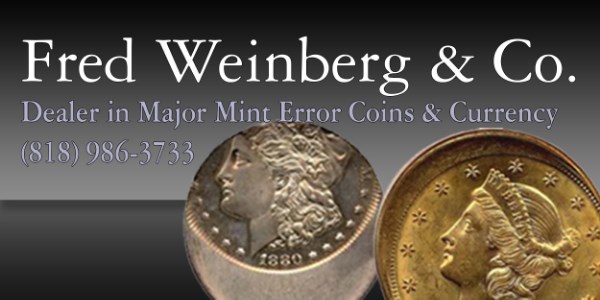
NOTES FROM E-SYLUM READERS: APRIL 26, 2020
More on 1883 No Cents Nickels
Bern Nagengast writes:
"The 1883 Nickel Rush" entry in the April 19 E-Sylum has Dave Bowers noting that: "All across America, men, women, and children scrambled to gather as many of these rarities as could be found. Nearly everyone was lucky. Some were able to squirrel away dozens."
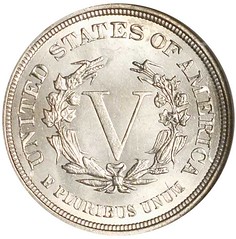 "I believe this was factual. When I was first collecting in 1964 my grandmother mentioned that she had some old coins her father had saved. Expecting the usual well
worn coins I was astounded when she showed me ten 1883 nickels that looked brilliant uncirculated. She asked me if they were valuable. Consulting my trusty "Redbook" I was
disappointed to find out they were all of the "without cents" variety, worth only a few dollars in BU.
"I believe this was factual. When I was first collecting in 1964 my grandmother mentioned that she had some old coins her father had saved. Expecting the usual well
worn coins I was astounded when she showed me ten 1883 nickels that looked brilliant uncirculated. She asked me if they were valuable. Consulting my trusty "Redbook" I was
disappointed to find out they were all of the "without cents" variety, worth only a few dollars in BU.
"My grandmother had no idea why her father saved the coins or when he got them, and at that time I could only wonder too. Since then I learned the story behind the 1883 Liberty Head Nickels. My great grandfather apparently was just one of those who scrambled to hoard what he thought was something of great rarity. I still have one of those nickels – it's not the rarest or most valuable coin I've owned, but it's priceless to me."
Great story! Thanks for sharing this. -Editor
To read the earlier E-Sylum article, see:
THE 1883 NICKEL RUSH (https://www.coinbooks.org/v23/esylum_v23n16a21.html)
1952 Proof Penny Legend Translation
Regarding the legend on the 1952 Proof Penny, Ron Haller-Williams writes:
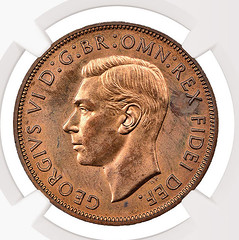 "of ... the Britons" would be "Britannorum" or "Brittonum". But it is clear from earlier coinage (e.g. "Britanniar: Rex" on the
copper coins of George IV) that the abbreviation "Br" or "Britt" is for "Britanniarum".
"of ... the Britons" would be "Britannorum" or "Brittonum". But it is clear from earlier coinage (e.g. "Britanniar: Rex" on the
copper coins of George IV) that the abbreviation "Br" or "Britt" is for "Britanniarum".
Hence, "of all the Britains" - i.e. Britain and its colonies and dominions. That is why, in recognition of the independence of many of these, the phrase was dropped from 1954. I think you'll find this is echoed by official sources and most books."
Steve Hill of Sovereign Rarities writes:
"Many thanks indeed for the Latin correction and for taking an interest in reading about the 1952 Proof Penny. I am going to change that part of the description now and elsewhere where quoted wrong on the website. We appreciate it."
Chip Howell echoed Ron's comments. The corrected text is "The abbreviated Latin legend translates as "George the Sixth, by the grace of God, King of all the Britains, Defender of the Faith" the Emperor of India title having been dropped since 1949."
We've updated our archive to match. Thanks, everyone. -Editor
To read the earlier E-Sylum article, see:
THE UNIQUE 1952 GEORGE VI PROOF PENNY (https://www.coinbooks.org/v23/esylum_v23n16a24.html)
Book: Norwegian Tokens
Yosef Sa'ar passed along this note from the group Transportation Token Collectors on Facebook:
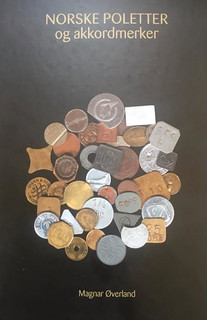 "Just bought a copy of "NORSKE POLETTER og akkordmerker" by Magnar Øverland, an outstanding catalog of all types of tokens of Norway. Published in 2003,
it contains 143 pages with hundreds of color token photos. Likewise, there is a fifteen page supplement with estimated values in Norwegian kronur. Transportation tokens take up
the first section of the book, 21 pages. The text is all in Norwegian. Recommended."
"Just bought a copy of "NORSKE POLETTER og akkordmerker" by Magnar Øverland, an outstanding catalog of all types of tokens of Norway. Published in 2003,
it contains 143 pages with hundreds of color token photos. Likewise, there is a fifteen page supplement with estimated values in Norwegian kronur. Transportation tokens take up
the first section of the book, 21 pages. The text is all in Norwegian. Recommended."
Thanks! -Editor
To visit the Facebook group, see:
https://www.facebook.com/groups/transportationtokens/
National Archives Transcription Update
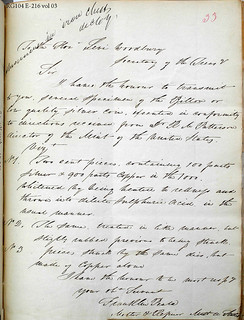 Roger Burdette writes:
Roger Burdette writes:
"The volunteer transcribers have completed almost 100 documents since they began a couple of weeks ago. Their work is clear, accurate and immensely helpful in opening early US Mint archives to research.
As said in many old letters "A hearty Thank You to one and all."
Thanks, everyone! As noted earlier, this is a great project that will benefit the hobby for generations to come.
Below is a link to a batch of transcribed letters from the U.S. Mint general correspondence series at the National Archives for the year 1838. Many of these were transcribed by Roger and an earlier, and still active, group of volunteers recruited from PCGS message board members. Some do not yet have transcriptions but all are great examples of original handwritten documents. -Editor
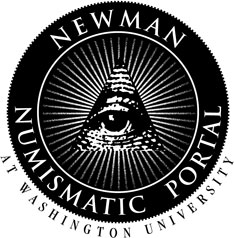 To view the letters, see:
To view the letters, see:
U.S. National Archives (Record Group 104, Entry 1, General Correspondence)
(https://nnp.wustl.edu/library/archivedetail/515202?Year=1838&take=50)
To read the earlier E-Sylum articles, see:
JOIN NATIONAL ARCHIVES TRANSCRIPTION INITIATIVE (https://www.coinbooks.org/v23/esylum_v23n13a09.html)
NATIONAL ARCHIVES TRANSCRIPTION UPDATE (https://www.coinbooks.org/v23/esylum_v23n14a20.html)
Query: Wurtzbach Inscription
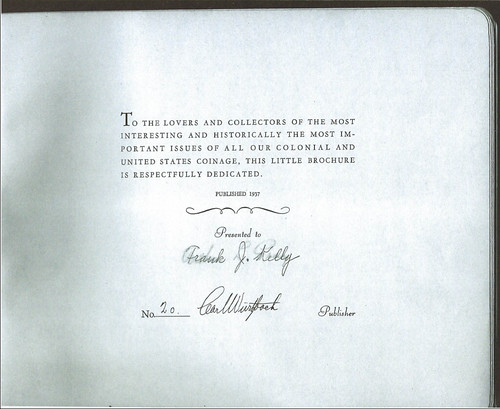
Wayne Myers of Pittsfield, MA writes:
"I'm sure by this time everyone is suffering from "cabin fever" so I would like to request some assistance from the E-Sylum readers.
I currently have copy number 20 of the Carl Wurtzbach Massachusetts Silver book - see the above image of the presentation page. This book was presented to Frank J. Kelly who was a neighbor of Carl's in Lee Mass.
My question is, has anyone seen a copy of this book that appears to have been recycled? If you look at Frank Kelly's name there is clearly another name written underneath. Has anyone seen a similar presentation copy with two names? I would also like to know if anyone can make out what the name is that was originally listed. Had the person died or did Carl Wurtzbach change his mind about who would get copies?
Historically what I remember from a very brief conversation with Frank Kelly about 25 years ago was he had the book since around 1937 or 1938, he would have been in his early 30's at the time. Frank was very proud of this book and told me he was a neighbor and friend of Carl Wurtzbach. Frank had stopped by for one of the monthly meetings the Berkshire Coin Club to donate this volume to club so it would remain in Western Massachusetts. I was president of the club at that time and unfortunately do not recall much of the conversation. Frank never mentioned the other name under his at the time. Unfortunately Frank passed away several years after donating the book.
A number of years ago the membership voted to sell off the club library which was basically unused. I was fortunate to be the high bidder for this volume. It currently resides in a place of honor in my book case.
Any help would be appreciated. I also wonder how many books are actually out there and what numbers. I know ANA has #1, I have #20, #24 was to Sheldon and #38 was auctioned by Charles Davis with no name.
Thanks again for all the work every week putting together The E-Sylum. It remains something to look forward to every Sunday night."
My copy is #75 and it's uninscribed with no evidence of a name having been removed. I bought it in 1994 from Money Tree sale #21 (lot 196).
Can anyone help? Below is a close-up of the inscription. The middle initial looks like an "L" to me, although that could be the first letter of the last name. That's all I can make out. You can click on the image to see the original versions in our Flickr archive. I think this one will be tough to solve from images.
Does anyone else have a reinscribed copy? -Editor
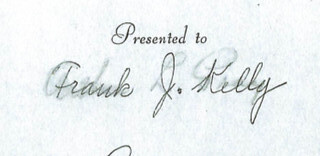
Medieval Magic? Mystery Amulet
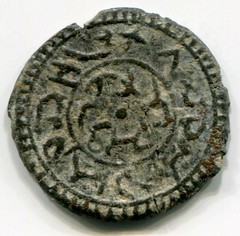
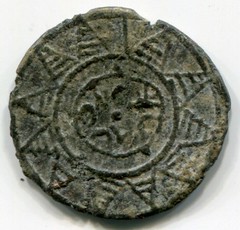
Bob Leonard writes:
"When I was in Jerusalem in July 1999 I purchased some Crusader lead tokens from the late Shraga Qedar, and among them was this 21-mm item which he said came from Caesarea.
"Qedar thought it was from the Crusader period (1099-1291) because it resembles a lead piece illustrated in Schlumberger, Numismatique de L'Orient Latin, Pl V. 9, attributed to Sidon. But it isn't lead; from a break in the patina it can be seen to be copper.
"The "inscription" certainly isn't Latin or Arabic. I thought that it might be simply a nonsense, dummy inscription, but wonder if it is not Hebrew or some Kabbalistic symbols. Hebrew amulet expert Simcha Kuritzky took a look and didn't recognize it or understand the "inscription." He remarked that the reverse has 11 triangles in the margin—highly unusual.
"Vaguely similar seals are illustrated in Volume II of the Sixth and Seventh Books of Moses, Formulas of the Magic Kabala (n.d., n.p., "Published for the Trade"). This handmade item certainly looks medieval; is it a magic amulet for finding treasure or love? Does anyone know?"
Can anyone help? -Editor
1932 Washington - Gustav Adolf II Medal
Howard Daniel writes:
"I know Washington pieces are popular and I do not remember this one, which might be of interest to your readers."
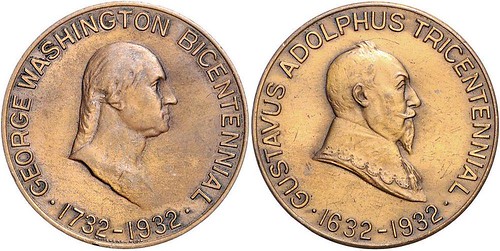
Lot 1210. VEREINIGTE STAATEN VON AMERIKA, Br.-Med. 1932 v.Waitehead-Hoar a.d. 200.Geburtstag von George Washington und den 300.Todestag von Gustav Adolf II. von Schweden. Büste von Washington r. Rs.Büste von Gustav Adolf II. r. 24,85g; 38mm. vz.
I wasn't familiar with this one, either. Thanks. It commemorates the birthday of George Washington and the anniversary of the death of Gustav Adolf II of Sweden. -Editor
To read the complete lot description, see:
Lot 1210. VEREINIGTE STAATEN VON
AMERIKA, Br.-Med. 1932 (https://www.sixbid.com/en/emporium-hamburg-muenzhandelsgesellschaft/7261/world-coins/5934389/vereinigte-staaten-von-amerika-br-med)
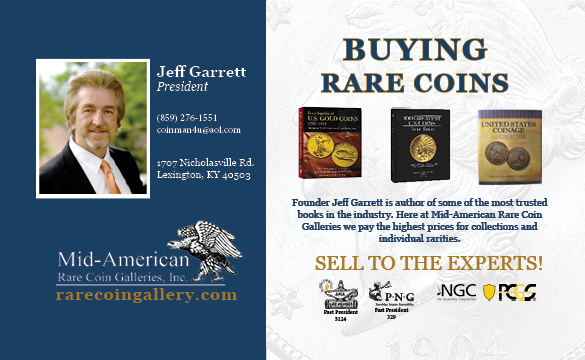
VOCABULARY TERM: MEDAL
Dick Johnson submitted this entry from his Encyclopedia of Coin and Medal Terminology. Thanks. -Editor
Medal. A memorial piece, of historic, commemorative, or artistic design, made in any of various ways – basically cast or struck – originally in the shape similar to a coin (but without denomination and certainly not intended to pass for money). In general, the word medal includes all forms of medallic items (except plaques); but also has a specific, numismatic definition: A medal is a round, or nearly so, medallic item between one and approximately three inches (25–80mm) diameter.
Early use of term medal As all-encompasing a term as is "medals" – meaning almost everything medallic – the term originally meant even more. It once meant uncurrent coins as well, particularly those housed in collections. Undoubtedly this came from the early Low Latin word medalla which meant "a small coin."
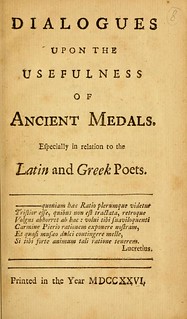 Numismatic curator Jean Babelon once wrote: "In Italy the term ‘medal' was applied to pieces preserved in collections because they were no longer current and had a
purely scientific or historical interest." This was expressed in the title of a classic work by John Addison in the 17th century, "Dialogues upon the Usefulness of Ancient
Medals," was a book on ancient coins!
Numismatic curator Jean Babelon once wrote: "In Italy the term ‘medal' was applied to pieces preserved in collections because they were no longer current and had a
purely scientific or historical interest." This was expressed in the title of a classic work by John Addison in the 17th century, "Dialogues upon the Usefulness of Ancient
Medals," was a book on ancient coins!
Medal characteristics. Medals have a very wide appeal, both for their beauty, artistic design, topical subject matter and ability to present a portrait, but also for their historic value. Medals are the most ideal form of commemorating an event or person because of their permanence. We know of events from the past, where and when – and who was involved – because of medals. Medals can exist and pass on these pictorial elements and lettering to people in the future for thousands of years.
Medals are the link between numismatics and virtually everyone in the world. They are the most coveted, distinctive way to honor a scientist, humanitarian or athlete. Every intelligent person in the world knows of the award ceremony of the Nobel Medal in Sweden, or the Olympic medals on the tri-tiered steps at the Olympic games. Medals can be created to honor the school child for excellence in studies, or the inventor of a lifesaving serum. Medals are permanent records of man's achievements, noble events, and personal accomplishments!
Medals are also an ideal medium for portraits. The first use of the medal created by Pisanello in 1438 was to bear a portrait. Royal families took to medals for individual portraits and passed them to other royal families much like we send family photographs today.
Of equal importance to the pictorial element on medals – its DEVICE – is its inscription, the lettering that names, explains, describes or amplifies the device. The obvious shortcoming of lettering is, of course, it has to be in a language that perhaps will not be in existence a thousand years from now. Can anyone read it then?
Just as we observe two-thousand year old coins with inscriptions in a dead language, will the language we put on medals today be understandable in the distant future? Will scholars of the future study English as a forgotten, obsolete tongue? Yet we have no other choice.
The chore rests with the medal designer, its creator. The goal is to design both device and inscription so attractive, so desirable, so enchanting, so appealing to be important enough to want to preserve it. Forever. Desired by both individuals and museums alike to want to posses it for the recall of its substance. To remember why it was issued.
Medal Characteristics
1) Longevity (Long lasting).
2) Beauty (Artisticness).
3) Image (Portraiture, Award, Honor).
4) Commemoration (Celebration).
5) Perspective Charm (Miniature Art).
6) Narration (Picture & Legend).
7) Intimacy (Personal Size).
8) Permanence (Hard Form).
9) Bilateral (Two-sidedness).
10) Accuracy (Documentation).
I added the image of the Addison book's title page. You can read the complete book on the Internet Archive at the below link. -Editor
To read the complete book, see:
Miscellaneous works : in verse and prose, of the late Right Honourable Joseph Addison, Esq; with
some account of the life and writings of the author (Volume 3) (https://archive.org/details/miscellaneouswor00addi/page/n10/mode/2up)
Looking for the meaning of a numismatic word, or the description of a term? Try the Newman Numismatic Portal's Numismatic Dictionary at: https://nnp.wustl.edu/library/dictionary
Or if you would like a printed copy of the complete Encyclopedia, it is available. There are 1,854 terms, on 678 pages, in The Encyclopedia of Coin and Medal Technology. Even running two a week would require more than 19 years to publish them all. If you would like an advance draft of this vital reference work it may be obtained from the author for your check of $50 sent postpaid. Dick Johnson, 139 Thompson Drive, Torrington, CT 06790.
JAMES KERSEL CRANSTON (1856-1916)
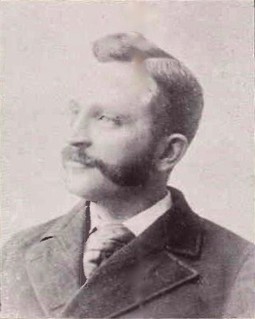 James Kersel Cranston (1856-1916), was born on August 14, 1856, at Cedar Creek, Canada, son of Alexander Cranston (1822-1886), and Marion Dickie Cranston
(1824-1895).
James Kersel Cranston (1856-1916), was born on August 14, 1856, at Cedar Creek, Canada, son of Alexander Cranston (1822-1886), and Marion Dickie Cranston
(1824-1895).
He graduated Dickie Settlement School.
He was an apprentice stationer in Port Hope, Ontario, Canada.
He married Eva McLean and they had three children Robert Stark Cranston (1882-1950), Helen Cranston(1888) died in infancy; Frederick L. Cranston (1899-1960).
From 1886 Cranston succeed his employer Mr. Youman in his stationery store in Galt, Canada.
In 1902, he issued a series of store cards and tokens in brass and aluminum.
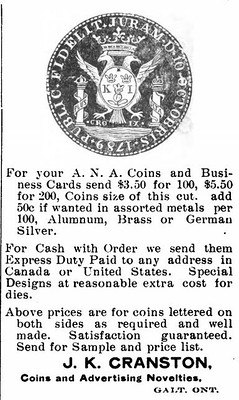
He died of rectal cancer on November 7, 1916. He is buried at Mount View Cemetery, Cambridge, Ontario, Canada.
John forwarded these images of Cranston's storecards. Thanks! -Editor

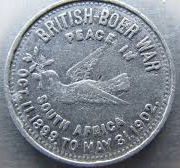
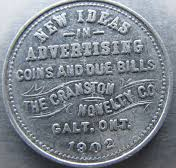
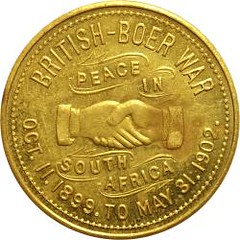
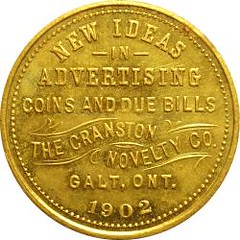
To read the complete article, see:
CRANSTON, JAMES KERSEL
(http://www.numismaticmall.com/numismaticmall-com/cranston-james-kersel)

HARVEY STACK'S NUMISMATIC FAMILY, PART 68
The latest article in Harvey Stack's blog series is about transporting the Eliasberg Collection to the Philadelphia Mint for the U.S. Bicentennial. Thanks, Harvey. -Editor
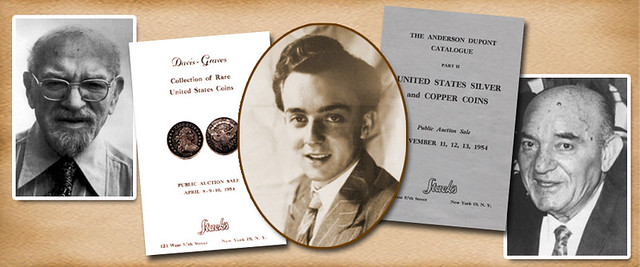
As I mentioned at the end of my last article, there was a last-minute glitch when the time came for the Eliasberg Collection to make its way to the Philadelphia Mint. It may sound unreal, but the grand display of the collection for the U.S. Bicentennial nearly didn't happen because of a technicality that affected one of the only people who had the power to put a halt to the plan.
The time came for the collection to be shipped from Baltimore to Philadelphia. The Mint was set to provide two large armored trucks staffed by armed guards, as well as three "chase cars" to go in front and behind the trucks. Louis E. Eliasberg, Sr. had wanted to accompany the collection and see it set up, but he became critically ill and was unable to go. He appointed his son, Louis, Jr., to go along and help get the display set up. When asked I agreed to be in Philadelphia when the "delivery" arrived and to help set up the display. It was an honor for those of us from Stack's to be part of this unbelievable display during our Bicentennial, and was a nice continuation of our relationship with Mr. Eliasberg and a reminder of the part our firm had played in building such an incredible collection.
Louis Jr., who in the past had worked with his father displaying the collection at banks in the Baltimore area, felt he had been given a great responsibility when asked to do this job. He wanted to ride in one of the trucks or "chase cars" and carry his gun, for which he had a Maryland gun permit. Although the Mint was providing plenty of security, having his firearm was very important to him. However, the Mint officials said that they could not allow him to carry his gun on this interstate journey.
Louis, Jr. was not happy about this at all. He stated that if he could not carry his weapon that the collection would not leave Baltimore! The Mint officials were stunned at this as all the arrangements had been made, the display area was all set up, and there was no way to come up with another option. I was very concerned and quickly called Louis Jr. to see what I could do to help. He was adamant; his father had asked him to take care of the collection and he was going to protect it.
My next step was to call people at the Treasury Department who had been part of the original agreement. I told him that Mr. Eliasberg's son felt that the only way he could fulfill his father's requirement to keep the collection safe was to bring his gun with him and was there anything they could do to make this happen. As the Treasury was also in charge of the gun and firearms department, a senior official at the Treasury had a special license issued for Louis, Jr. so he could bring his weapon on the interstate journey.
It was a harrowing few hours while all this was accomplished, but Louis, Jr. got his way and he personally supervised the moving of the collection into special shipping boxes, watched them loaded onto the trucks and saw the doors securely locked. He got into one of the "chase cars" with his gun on his lap. No one was going to make off with that collection if he had any way of stopping it! Luckily it did not become an issue and the convoy arrived safely at the Mint and I was there to meet it.
As he had in Baltimore, Louis Jr. supervised the removal of the shipping cases from the trucks, through the building, up to the special balcony where the collection was to be displayed. He supervised the setting up of the dozen or so special steel stands, and he personally unpacked each frame full of coins mounted in two sided holders so that the pieces were visible from both sides. They were inserted into the special holders that kept each of these frames upright, and each stand handled from 12 to 15 frames. In many cases each series could be viewed on both sides, and in chronological order. These special display tools had been made especially for Louis Eliasberg, Sr. to use when showing his collection to visitors at the bank. It was a clever design, created with viewers in mind. He had also previously produced a booklet about the coin display, which was used at the Mint during the Bicentennial.
After all the frames were in place on their vertical stands, Louis, Jr. inserted a special seal at the insertion points and then he was satisfied that all was secured. This concluded what had been a very exciting and challenging process, from broaching the idea to Mr. Eliasberg to making sure Louis, Jr. could bring his gun with him to Philadelphia. Millions visited the Mint during the Bicentennial and the numismatic display was one of the highlights of the event. Unfortunately, Louis E. Eliasberg, Sr. succumbed to his illness without having the chance to visit the display or hear the wonderful comments from the people who viewed it. Luckily, Louis, Jr. was able to photograph the exhibit and show the pictures to his father before he passed away.
To read the complete article, see:
Harvey Stack Remembers: Growing up in a Numismatic Family, Part 68
(https://www.stacksbowers.com/News/Pages/Blogs.aspx?ArticleID=Harvey-Stack-Remembers-Part-68)
To read the earlier E-Sylum article, see:
HARVEY STACK'S NUMISMATIC FAMILY, PART 67 (https://www.coinbooks.org/v23/esylum_v23n15a25.html)
SUBSCRIBER PROFILE: PAUL WITHERS
Money & Medals is a monthly newsletter for numismatics in Britain from the Money and Medals Network based at the British Museum and in association with the Royal Numismatic Society, British Numismatic Society and a number of key partners.
The April 2020 issue features three dealers giving "their different perspectives and experiences of the trade, talking about what got them hooked on the subject, and how this has developed over their career."
One of them is Paul Withers, who is familiar to E-Sylum readers for the great numismatic books he publishes with his wife Bente. With permission we're republishing the piece here. -Editor
Do you believe in predestination? Coins are one of my first memories. I have always loved them. I badgered relatives, and my parents' friends. Cupboards were searched and plundered. I liked my coins shiny, so all were polished and were stored in a tin with jubilee portraits of George V and Queen Mary on the lid. I was, I hasten to add, only four years old, and I don't think I ruined anything of quality.
Aged 6, staying with my widowed great aunt Clara, she found an 1897 medalet depicting four monarchs, a real treasure. I couldn't be parted from it. I even took it with me to the outdoor privy. Trying to admire it in the dark and pee at the same time, it fell. Splash! Devastated, sobbing, I fished it out and scrubbed my arm almost raw, and the medal got a special clean with harpic!
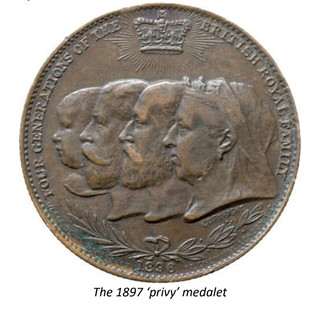 Aged 15, I was good at science, but wanted to earn money so didn't stay in school, going to work in the metallurgical laboratory of a steel works. Three years later,
earning little, I had only really enjoyed the brief time when I was seconded to the research department, so decided that education was the way forward after all, so ‘O' and ‘A'
levels at night school whilst I tried out life as a student teacher. Five years later I was an impecunious teacher, and collecting coins at a time when people were checking their
change and collecting date runs. I attended a meeting of the newly-formed coin club. People looked at my album and were impressed. I explained that these were duplicates. People
thrust money at me. I had become a part time dealer.
Aged 15, I was good at science, but wanted to earn money so didn't stay in school, going to work in the metallurgical laboratory of a steel works. Three years later,
earning little, I had only really enjoyed the brief time when I was seconded to the research department, so decided that education was the way forward after all, so ‘O' and ‘A'
levels at night school whilst I tried out life as a student teacher. Five years later I was an impecunious teacher, and collecting coins at a time when people were checking their
change and collecting date runs. I attended a meeting of the newly-formed coin club. People looked at my album and were impressed. I explained that these were duplicates. People
thrust money at me. I had become a part time dealer.
 Fast forward a few years and I was married, and although I loved teaching I was earning so little that had our infant son been of school age, he would have been eligible
for free school meals! I had a Sunday morning pitch in Cutler Street market, London. This produced as much income as a week of teaching. One Christmas we went to Denmark, my
wife's home, accounts in hand, to discover that my hobby was subsidizing my job. I left teaching. Fifty years ago dealers sent out printed lists. I had a 1930s typewriter bought
from auction for 30 shillings. £3 bought an ex- army electric duplicator. I wrote short articles and sent out sales lists by post.
Fast forward a few years and I was married, and although I loved teaching I was earning so little that had our infant son been of school age, he would have been eligible
for free school meals! I had a Sunday morning pitch in Cutler Street market, London. This produced as much income as a week of teaching. One Christmas we went to Denmark, my
wife's home, accounts in hand, to discover that my hobby was subsidizing my job. I left teaching. Fifty years ago dealers sent out printed lists. I had a 1930s typewriter bought
from auction for 30 shillings. £3 bought an ex- army electric duplicator. I wrote short articles and sent out sales lists by post.
What makes a professional numismatist these days? Firstly, you have to keep up to date with modern technology and move with the times, learning new skills when necessary. My wife and I have had a good deal of experience over the past half century, becoming, out of necessity, Jacks and Jills of all trades, from coin photography to specialist, multilingual typesetting, and printing. When the duplicator wore out £25 bought us a small, second-hand offset printing machine. A few years on we had the same electronic type-setting equipment as our local newspaper. There were only four such IBM machines in the entire county of Staffordshire. Then computers arrived. We were the first coin dealer in the UK to use one.
We bought a bigger and better machine and began printing sales lists for other dealers, as well as the ONS Newsletter, The Medal, and then, our own books. This involved learning skills such as editing and specialist typesetting. We even contemplated bookbinding!
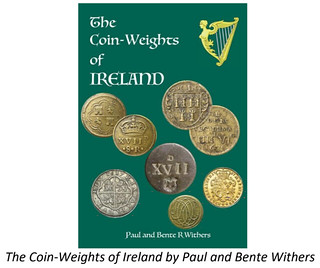

Being a numismatic publisher is like being a detective who applies the ABC principle. What's that? Assume Nothing. Believe Nothing. Challenge and check everything. Do that well and the book stands a reasonable chance of being good, providing you read and understand the previous literature on the subject. That of course, implies that you have a good library - and we have one of the best in Wales, all thanks to Howard Linecar, and Peter Seaby who encouraged me 45 years ago.
Paul and Bente Withers work very hard on their books and the results speak for themselves. We can only wish every numisamtic author had the same principles and relentless pursuit of the truth. It's hard to think of better (or easier to remember) guidelines than ABC.
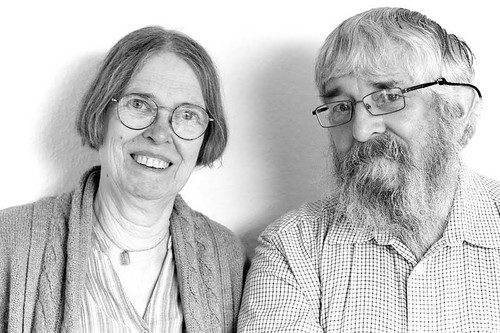
Bente and Paul Withers
To subscribe to Money & Medals by email just send your name and email address to the editor at MMN@britishmuseum.org. -Editor
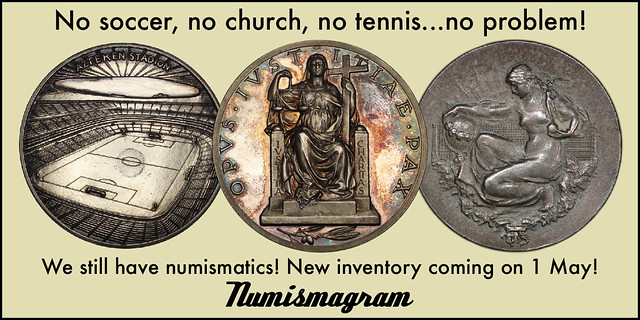
TELL US ABOUT YOUR NUMISMATIC LIBRARY
This week over on the CoinTalk discussion board, readers posted photos of their numismatic libraries. Here are a few of the photos - see the complete discussion online.
Maria Fanning is the editor of our print journal, The Asylum, and this is a good time to remind everyone to send her information about their own libraries for an upcoming issue. In our April 12, 2020 issue Maria wrote: "Please share with us how your library is arranged and decorated with unusual numismatic art and ephemeral items, too. As always, please share lots of photos of your inner sanctum and treasures. Please send submissions to asylum@coinbooks.org by May 1 to be included." -Editor
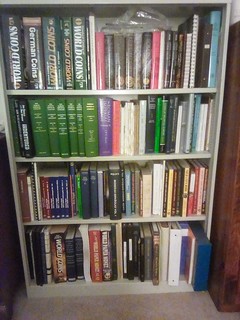
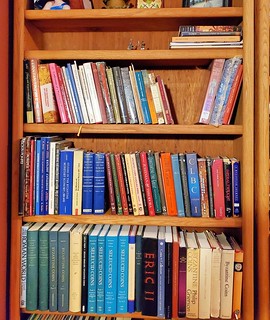
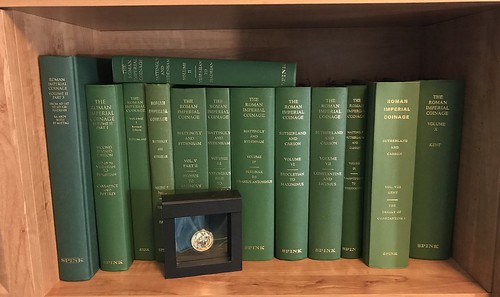
To read the complete CoinTalk discussion, see:
Coin Books, Discussion in 'Ancient Coins' started by BenSi
(https://www.cointalk.com/threads/coin-books.358827/)
To read the earlier E-Sylum article, see:
TELL US ABOUT YOUR NUMISMATIC LIBRARY (https://www.coinbooks.org/v23/esylum_v23n15a02.html)
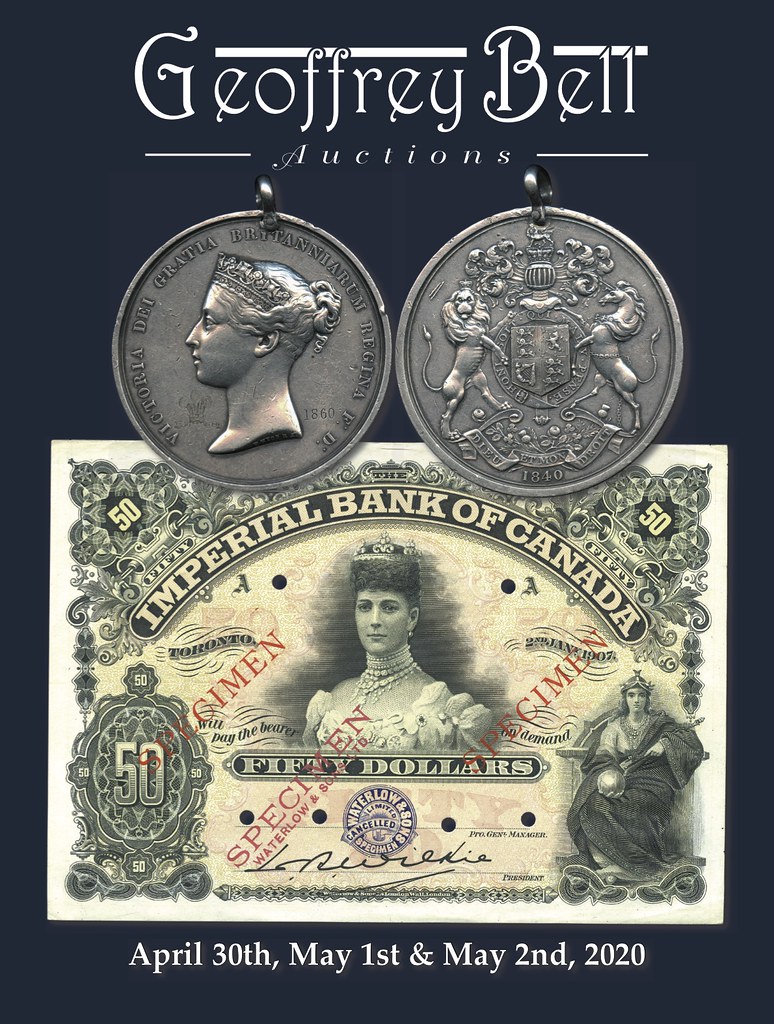
ALBUM MAY 2020 E-AUCTION 7 ANNOUNCED
Here's the press release for the May 2020 E-Auction 7 sale from Stephen Album Rare Coins. -Editor
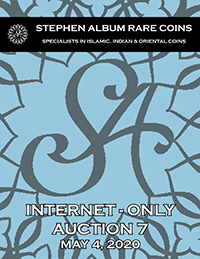 Stephen Album Rare Coins has published their 7th Internet-Only Auction. Bids can be placed now on the bidding website, and live bidding is also available during the live
session which begins at 10:00am PDT on Monday 4 May 2020. The sale features exactly 500 individual coin lots with starting prices ranging from 30 USD to 1,600 USD.
Stephen Album Rare Coins has published their 7th Internet-Only Auction. Bids can be placed now on the bidding website, and live bidding is also available during the live
session which begins at 10:00am PDT on Monday 4 May 2020. The sale features exactly 500 individual coin lots with starting prices ranging from 30 USD to 1,600 USD.
The coins in the sale range from all areas and time periods, including machine-struck coins from all continents, Chinese cash coins and struck coins and medieval hammered Indian & Islamic coins.
One category that is expected to perform well is the Shahs of Iran. Composing around 15% of the auction, the offerings are primarily gold and are mostly from the Zand and Qajar dynasties.
There are also many nice offerings in the World Coins section, including some choice items graded by PCGS.
It is possible to bid prior to the auction, and it is also possible to bid live during the auction as the lots hammer down one at a time.
All bids must be placed through the online bidding website at: www.sarc.auction
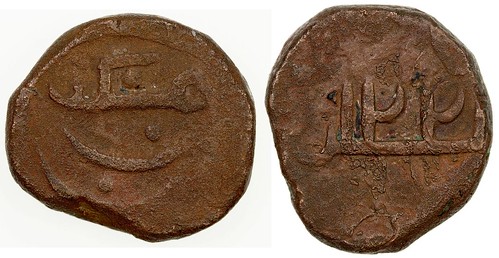
LOT 12
SULAYMANI SHARIF: temp. Yahya b. Surur, 1803-1827, AE mahmudi (18.93g), Makka, AH122(2), A-S1160, KM-2, mint name on obverse, date on reverse, much porosity on both sides as
usual, Fine
The Wahhabi Sharifs struck anonymous copper coins from AH1215 to AH1240, with the possible addition of a few coins dated earlier in the AH1200s. They are rather heavy and
resemble contemporary coarsely struck copper paisa's of western India, whence it is conceivable that Muslim manufacturers from India came to Arabia to prepare these coins. All
are quite rare!
Estimated At: 1,800.00 - 2,000.00 USD
https://www.sarc.auction/item.aspx?i=36763046
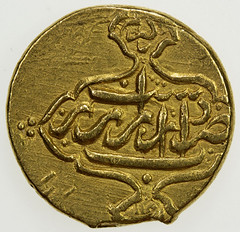
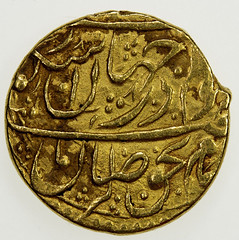
LOT 61
ZAND: Karim Khan, 1753-1779, AV ½ mohur (5.41g), Rasht, AH1191, A-2788, type C, nice strike for this type, choice VF
https://www.sarc.auction/item.aspx?i=36763095
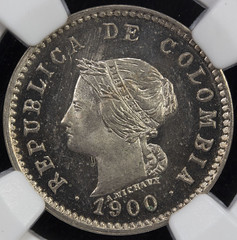
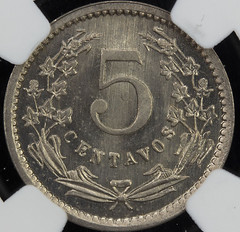
LOT 132
COLOMBIA: Republic, 5 centavos, 1900, KM-Pn76, Restrepo-66, 22mm copper-nickel pattern by Albert Michaux, NGC graded MS64 (but should have been labeled PF-64!)
https://www.sarc.auction/item.aspx?i=36763166
Here are some additional lots that caught my eye in the sale. -Editor
Lot 60: Countermarked Tahmasp I Shahi
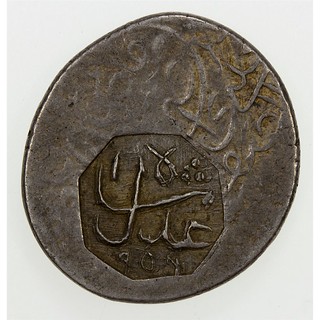
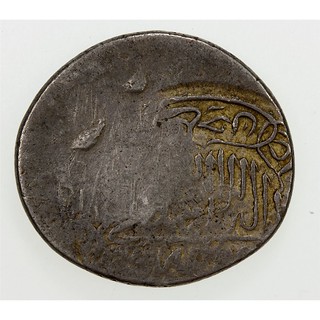
SAFAVID: Tahmasp I, 1524-1576, AR shahi (4.60g), NM, AH956, A-2611R, countermarked 'adl-i shah 956 on weakly struck example of type A-2601, first reported example with a legible date in the countermark, EF, RR.
Neat countermark. -Editor
To read the complete lot description, see:
SAFAVID: Tahmasp I, 1524-1576, AR shahi (4.60g), NM, AH956. EF
(https://www.sarc.auction/SAFAVID-Tahmasp-I-1524-1576-AR-shahi-4-60g-NM-AH956-EF_i36763094)
Lot 84: Muhammad Shah Toman
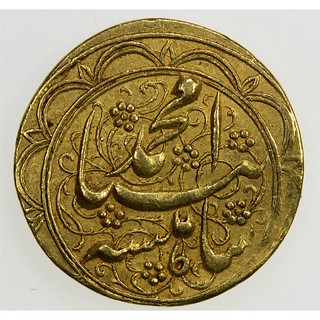
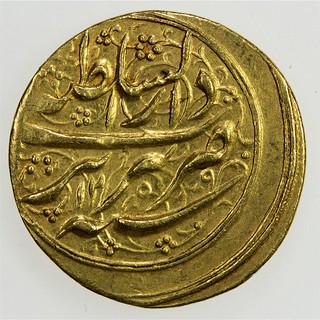
QAJAR: Muhammad Shah, 1837-1848, AV toman (3.47g), Tabriz, AH1259, A-2904, bold strike, choice EF.
Nice gold coin. -Editor
To read the complete lot description, see:
QAJAR: Muhammad Shah, 1837-1848, AV toman (3.47g), Tabriz, AH1259.
EF (https://www.sarc.auction/QAJAR-Muhammad-Shah-1837-1848-AV-toman-3-47g-Tabriz-AH1259-EF_i36763118)
Lot 175: 1912 German Shooting Festival Medal
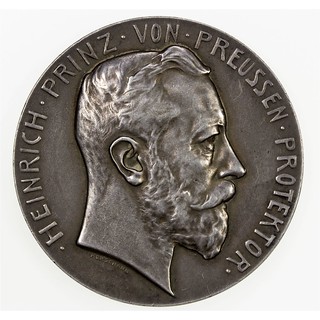
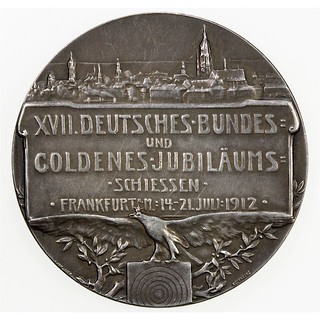
FRANKFURT: AR medal (25.46g), 1912, Steulmann-3, Peltzer Coll.-1154, 40mm silver award medal for the 17th German Federal Shooting Festival by Korschann for Lauer, Nuremberg, cartouche inscribed with XVII.DEUTSCHES BUNDES= / UND / GOLDENES JUBILÄUMS= / SCHIESSEN / FRNAKFURTa.M.:14.-21.JULI:1912 with eagle with outstreched wings on target below and city view above // bust left with HEINRICH PRINZ VON PREUSSEN PROTEKTOR around, matte finish, attractive original tone, SILBER 990 on edge, EF to AU.
Nice city view shooting medal. -Editor
To read the complete lot description, see:
FRANKFURT: AR medal (25.46g), 1912, 17th German Federal
Shooting Festival, EF-AU (https://www.sarc.auction/FRANKFURT-AR-medal-25-46g-1912-17th-German-Federal-Shooting-Festival-EF-AU_i36763209)
Lot 228: 1932 Weimar Republic Nazi Medal
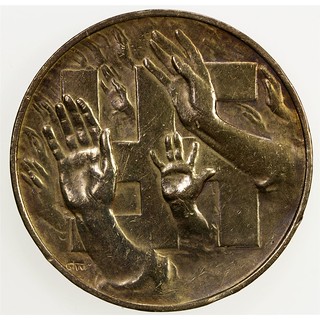
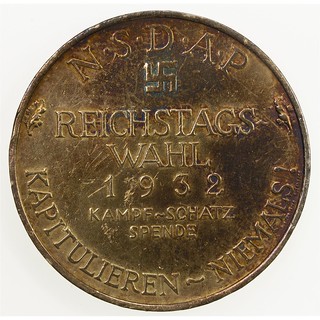
GERMANY: Weimar Republic, AR gilt medal (19.84g), 1932, Hyder & Colbert-D23, 35mm gilt silver election donation medal by the NSDAP, hands raised all around a large swastika // (swastika) / REICHSTAGS- / WAHL / 1932 / KAMPF-SCHATZ / SPENDE in center with N.S.D.A.P KAPITULIEREN-NIEMALS! around, toned reverse, lightly cleaned, "990" on edge, VF to EF, R.
Truly creepy obverse image. -Editor
To read the complete lot description, see:
GERMANY: Weimar Republic, AR gilt medal (19.84g), 1932. VF-EF
(https://www.sarc.auction/GERMANY-Weimar-Republic-AR-gilt-medal-19-84g-1932-VF-EF_i36763262)
Lot 304: 1929 Lundy Half Puffin
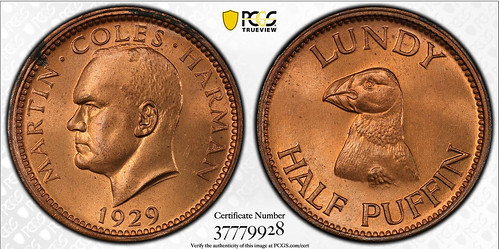
LUNDY: AE ½ puffin, 1929, KM-Tn1, PCGS graded MS65 RD. Harman issued two coins of ½ puffin and 1 puffin denominations in 1929, nominally equivalent to the British halfpenny and penny, resulting in his prosecution under the United Kingdom's Coinage Act of 1870. The House of Lords found him guilty in 1931, and he was fined £5 with fifteen guineas expenses. The coins were withdrawn and became collectors' items.
Micronation state coinage is always interesting. -Editor
To read the complete lot description, see:
LUNDY: AE 1/2 puffin, 1929. PCGS MS65
(https://www.sarc.auction/LUNDY-AE-1-2-puffin-1929-PCGS-MS65_i36763338)
Lot 355: 1918 Gratitude of The Swiss Families Medal
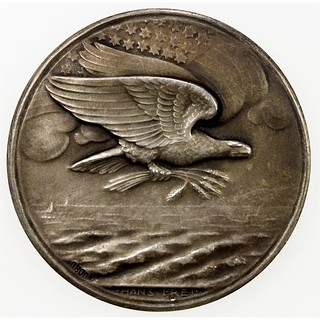
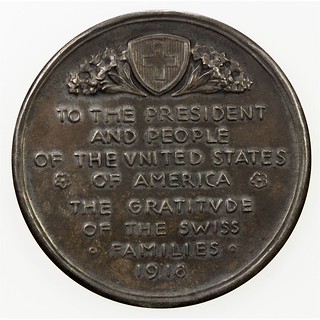
SWITZERLAND: AR medal (24.70g), 1918, Schweizer Medaillen-215, 40mm silver medal by Hans Frei, eagle flying right over sea with American flag above and holding sheaf of wheat in talons above sea with 0.800 stamped incuse at lower left margin // Swiss shield flanked by flowers with TO THE PRESIDENT / AND PEOPLE / OF THE UNITED STATES / OF AMERICA / THE GRATITVDE / OF THE SWISS / FAMILIES / 1918 below, matte finish, toned, plain edge, UNC.
Love the flying eagle. -Editor
To read the complete lot description, see:
SWITZERLAND: AR medal (24.70g), 1918, Gratitude of The
Swiss Families to USA, UNC (https://www.sarc.auction/SWITZERLAND-AR-medal-24-70g-1918-Gratitude-of-The-Swiss-Families-to-USA-UNC_i36763389)
Lot 367: BOSTONIA CONDITA Medal
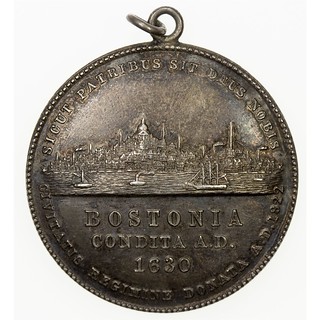
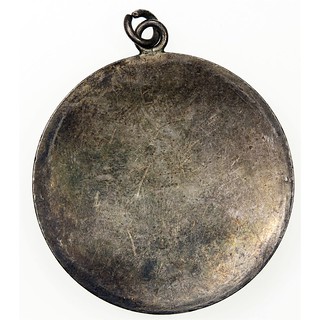
UNITED STATES: AR medal, 1822 (8.69g), EF to AU, 32mm uniface silver medal, seal of the city of Boston with view of city and ships at center with BOSTONIA / CONDITA A.D. / 1630 below and SICUT PATRIBUS SIT DEUS NOBIS - * CIVITATIS REGIMINE DONATA A.D.1822 * around, with added loop and ring, convex obverse, probably made in the late 1800's, attractive original tone on obverse, graffiti on reverse reads J. E. / WALKER / Z. Y. / Cobby '29' / Y B, plain edge, cf. Stack's Bowers February 2019 Baltimore Auction Lot 285,
Thanks to Howard Daniel for pointing this one out. I wasn't familiar with this piece either. -Editor
To read the complete lot description, see:
UNITED STATES: AR medal, 1822 (8.69g), seal of the city of Boston,
EF-AU (https://www.sarc.auction/UNITED-STATES-AR-medal-1822-8-69g-seal-of-the-city-of-Boston-EF-AU_i36763401)
THE BOOK BAZARRE
SEDWICK MAY 2020 AUCTION 27 SELECTIONS
Here are some lots that caught my eye in the May 2020 Auction 27 sale from Daniel Frank Sedwick. -Editor
Lot 9: 1715 Fleet Peru Cob 8 Escudos
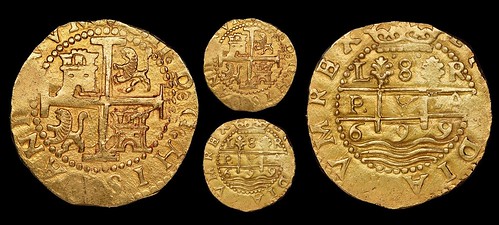
Lima, Peru, cob 8 escudos, 1699R, P.V.A. variety, NGC MS 62, ex-1715 Fleet (designated on special label). S-L26; KM-26.1; Cal-968. 26.93 grams. Broad flan with much legend, good full inner details (the waves and left pillar particularly bold), well-detailed lions and castles with minor doubling and die-crack, hint of reddish toning, variety with dots after P, V and A in middle of pillars (considered a different type in KM). NGC #4762817-004. From the 1715 Fleet.
Wow. Great coin. -Editor
To read the complete lot description, see:
Lima, Peru, cob 8 escudos, 1699R,
P.V.A. variety, NGC MS 62, ex-1715 Fleet (designated on special la
(https://auction.sedwickcoins.com/Lima-Peru-cob-8-escudos-1699R-P-V-A-variety-NGC-MS-62-ex-1715-Fleet-designated-on-special-la_i36804112)
Lot 172: 1631 Concepcion Mexico Cob 8 Reales
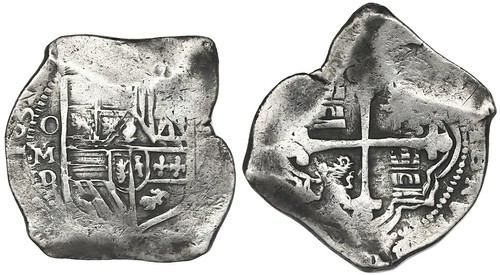
Mexico City, Mexico, cob 8 reales, 1631D, very rare. S-M18a; KM-45; Cal-unl. 25.72 grams. Clear date (first we have offered as a clean date, missing in Calico) and bold full oMD, choice cross with distinctive ends, also choice shield, flat peripheries but no corrosion, very nicely toned. Recovered from: Concepcion, sunk in 1641 off Hispaniola
To read the complete lot description, see:
Mexico City, Mexico, cob 8 reales, 1631D, very rare.
(https://auction.sedwickcoins.com/Mexico-City-Mexico-cob-8-reales-1631D-very-rare_i36804275)
Lot 357: 1729 United Netherlands Gold Ducat

Holland, United Netherlands, gold ducat, 1729, NGC MS 65. KM-12.2. Typically lustrous and fully detailed, with several copper spots and evidence of light die-clash in center. NGC #4753542-001. Recovered from: Vliegenthart, sunk in 1735 off Zeeland, Netherlands
Nice coin. -Editor
To read the complete lot description, see:
Holland, United Netherlands, gold ducat, 1729, NGC MS 65.
(https://auction.sedwickcoins.com/Holland-United-Netherlands-gold-ducat-1729-NGC-MS-65_i36804460)
Lot 404: Bredenhof Clump of Dutch Copper Duits
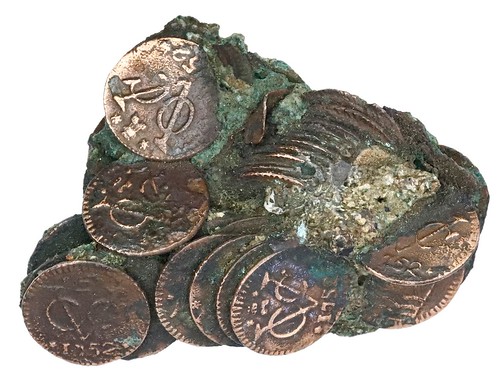
Large, attractive clump of 25-30 Dutch copper duits (Zeeland, 1752). KM-81. 168.48 grams total. Triangular agglomeration of fallen stacks of coins, the top ones fairly well detailed (most with VOC and date showing), with lots of dark encrustation (tinged with green) on bottom and in between, a great display. With original (generic) certificate from the salvagers.Recovered from: Bredenhof, sunk in 1753 off Mozambique
Great exhibit item / conversation piece / paperweight. -Editor
To read the complete lot description, see:
Large, attractive clump of 25-30 Dutch copper duits (Zeeland,
1752). (https://auction.sedwickcoins.com/Large-attractive-clump-of-25-30-Dutch-copper-duits-Zeeland-1752_i36804507)
Lot 434: Andrea Doria Salvaged Silver Certificate
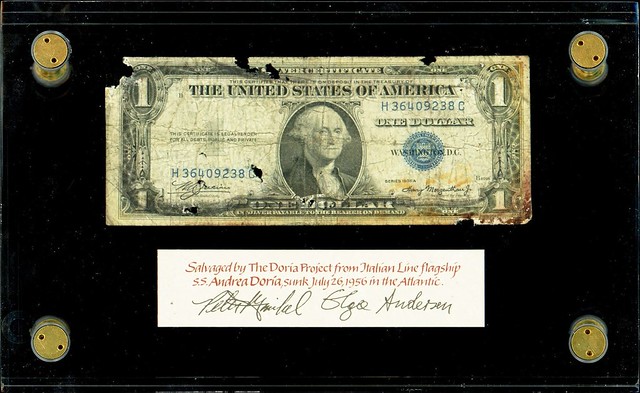
USA, $1 silver certificate, series 1935A, serial H36409238C, Julian-Morgenthau, salvaged from the Andrea Doria (1956), in large lucite capsule and original promotional case. 12-1/2" x 8-1/4" x 2" (whole case). Very tough series from this wreck with only a handful found in the safe and among some of the earliest notes found, having been printed sometime between 1938 to 1944. Usual edge degradation and staining from spending 25 years underwater yet quite intact with some evidence of circulation. With original display box, salvager's certificate, and informational brochure. Andrea Doria, sunk in 1956 off Nantucket
Neat shipwreck paper. -Editor
To read the complete lot description, see:
USA, $1 silver certificate,
series 1935A, serial H36409238C, Julian-Morgenthau, salvaged from the An
(https://auction.sedwickcoins.com/USA-1-silver-certificate-series-1935A-serial-H36409238C-Julian-Morgenthau-salvaged-from-the-An_i36804537)
Lot 664: 1662 Colombia Cob 8 Reales
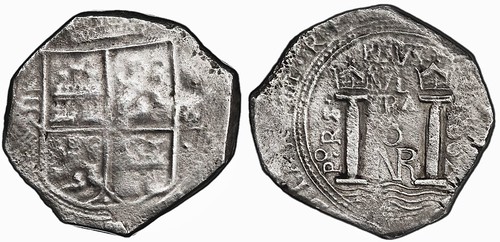
Bogota, Colombia, cob 8 reales, 1662, assayer Po.RS., pomegranate to right, very rare, PCGS VF detail / salt water damage. Restrepo-M46.28; S-B7; KM-7.1; Cal-1558. Bold full shield with denomination VIII to left and full pomegranate to right, very bold full pillars (complete crowns above) with bold Po.RS. to left and weak but certain date 166Z to right (both vertical), full mintmark oNR, choice strike but with light corrosion on cross side only, die-match with Waldo Newcomer specimen. PCGS #39179293.
Great coin. -Editor
To read the complete lot description, see:
Bogota, Colombia, cob 8 reales,
1662, assayer Po.RS., pomegranate to right, very rare, PCGS VF detai
(https://auction.sedwickcoins.com/Bogota-Colombia-cob-8-reales-1662-assayer-Po-RS-pomegranate-to-right-very-rare-PCGS-VF-detai_i36804767)
Lot 850: 1855 Colombia Una Mitad Token
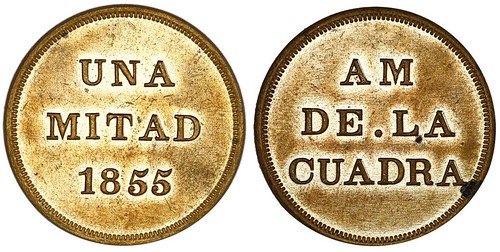
Magdalena, Colombia (struck by Scovill Manufacturing, Waterbury, Connecticut), brass una mitad (half cuartillo) token, 1855, AM de la Cuadra, NGC MS 62, ex-Norweb. Rulau-Mag-5; Fonrobert-8263. Nice brass color with original luster around details, which include AM / DE LA / CUADRA on obverse and UNA / MITAD / 1855 on reverse, minimal marks and a couple dark spots only. NGC #5850277-003. Pedigreed to the Norweb collection.
Great token with a U.S. connection and great pedigree. -Editor
To read the complete lot description, see:
Magdalena, Colombia (struck by
Scovill Manufacturing, Waterbury, Connecticut), brass una mitad (half
(https://auction.sedwickcoins.com/Magdalena-Colombia-struck-by-Scovill-Manufacturing-Waterbury-Connecticut-brass-una-mitad-half_i36804937)
Lot 914: Costa Rica Countermarked Indian Cent
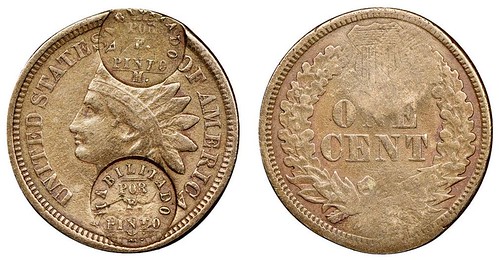
San Miguel, Costa Rica, copper-nickel 1 centavo token, double countermark for Francisco Pinto (ca. 1870) on a US Indian Head cent, 1862, NGC VF details / cleaned, Rulau Plate. Rulau-SJS-98. Bold full countermarks saying HABILITADO POR F. PINTO M. in reference to the coffee estates of Francisco Pinto, both deeply impressed on obverse of light-colored host with full details outside the countermarked areas, with the exception of the date, which is clear despite being overmarked (not mentioned on label). NGC #5846759-005. Plated in Russell Rulau's Latin American Tokens, 2nd edition (2000).
Very interesting piece - I hadn't seen this before. -Editor
To read the complete lot description, see:
San Miguel, Costa Rica,
copper-nickel 1 centavo token, double countermark for Francisco Pinto (ca. 1
(https://auction.sedwickcoins.com/San-Miguel-Costa-Rica-copper-nickel-1-centavo-token-double-countermark-for-Francisco-Pinto-ca-1_i36805001)
Lot 1321: 1819 Colombia 50 centavos
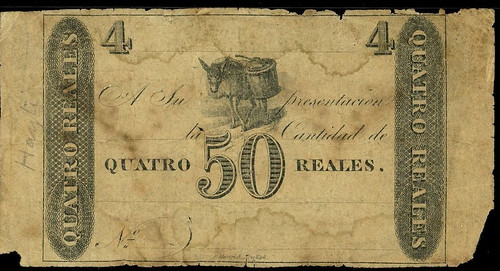
Colombia, 50 centavos / 4 reales remainder, no date (1819), PMG VG 10, rare. SCWPM-4r; CHPM-3693. Another example of early Colombian paper money, this note was created during Simon Bolivar's campaign to liberate Nueva Granada and establish the first Republic of Colombia. The design, created by P. Maverick of New York, has a burro carrying goods as the central vignette with denominators on either side. Well circulated with some small pieces missing from the wide margins, pencil annotation along the left margin, strong black ink. Very rare in any form and desirable as a historical note issued during one of the most pivotal times in Colombia's formation. PMG #8071186-001.
There's some nice paper money in this sale, including some U.S. colonial notes, -Editor
To read the complete lot description, see:
Colombia, 50 centavos / 4 reales remainder, no date
(1819), PMG VG 10, rare. (https://auction.sedwickcoins.com/Colombia-50-centavos-4-reales-remainder-no-date-1819-PMG-VG-10-rare_i36805408)
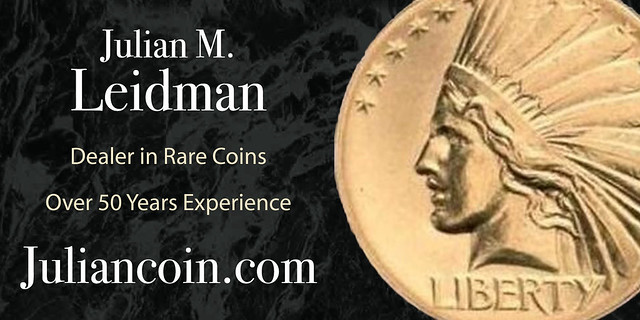
FEISEL MAY 2020 TOKEN SALE SELECTIONS
Here are some lots that caught my eye in the May 2020 token sale from Duane Feisel. -Editor
Lot 86: Jellico, Tennessee Daisy Saloon Token
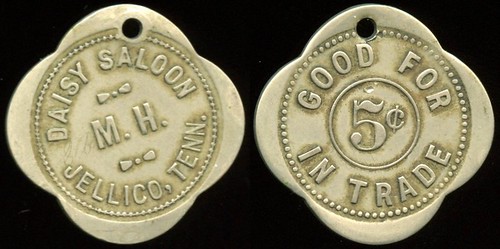
SALOON - Tennessee, Jellico
Lot 86: DAISY SALOON / M.H. / JELLICO, TENN. // Good For / 5¢ / In Trade, wm sc-4 28mm, holed @12:00. Listed 1. G3-MB$950
To read the complete lot description, see:
SALOON - Tennessee, Jellico Lot 86: DAISY SALOON
(https://collector-ca.smugmug.com/Tokens-Exonumia/2020-MAY-MAIL-BID-SALE/i-6Btv7NH)
Lot 114: Fort Douglas Utah Post Exchange Token
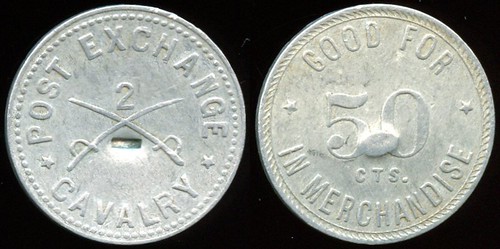
MILITARY - Utah, Fort Douglas
Lot 114: POST EXCHANGE / 2 / (crossed sabers) / (rectangular punchmark) / CAVALRY // Good For / 50 / Cts. / In Merchandise, (Fort Douglas), al rd 31mm. Unlisted! Campbell listed
different value. Believed to have served in Cuba during Spanish American War. Historical military unit! G3-MB$500
Great history, great rarity. -Editor
To read the complete lot description, see:
MILITARY - Utah, Fort Douglas Lot 114: POST EXCHANGE /
(https://collector-ca.smugmug.com/Tokens-Exonumia/2020-MAY-MAIL-BID-SALE/i-ThvLrCG)
Lot 117: Wyoming Territory Post Trader Token
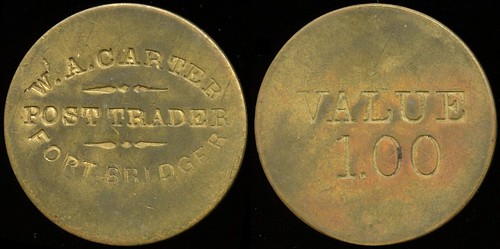
MILITARY - Wyoming / WT , Fort Bridger
Lot 117: W.A. CARTER / POST TRADER / FORT BRIDGER // Value / 1.00, (a/i O&R), br rd 39mm. Unlisted value WY20. G3-MB$100
Neat primitive Wyoming Territory piece. -Editor
To read the complete lot description, see:
MILITARY - Wyoming / WT , Fort Bridg
(https://collector-ca.smugmug.com/Tokens-Exonumia/2020-MAY-MAIL-BID-SALE/i-7kJwTHp)
Lot 203: F. Prentice Mining Medal
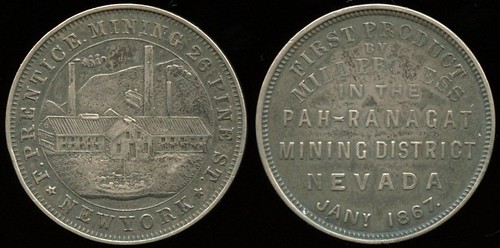
MEDAL - New York, New York
Lot 203: F. PRENTICE. MINING 26 PINE ST. / (mill) / NEW YORK // First Product / By / Mill Process / In The / Pah-Ranagat / Mining District / Nevada / Jany 1867., silver rd 32mm.
G3-MB$250
Nice pictorial mining piece. -Editor
To read the complete lot description, see:
MEDAL - New York, New York Lot 203: F. PRENTICE. MINING
(https://collector-ca.smugmug.com/Tokens-Exonumia/2020-MAY-MAIL-BID-SALE/i-pKwDW6Z)
Lot 360: Lesher Dollar Type I
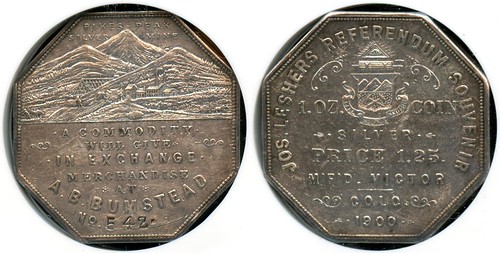
COLORADO - Lesher Dollar
Lot 360: Lesher Dollar HK-788, Type 1 reverse, serial number 542, graded AU 55 by Numismatic Guarantee Corporation. The pictures tell it all! G4-MB$1,750
Fascinating private coinage experiment. See the recent book by Bob Leonard. -Editor
To read the complete lot description, see:
COLORADO - Lesher Dollar
(https://collector-ca.smugmug.com/Tokens-Exonumia/2020-MAY-MAIL-BID-SALE/i-BrMCSDj)
Lot 466: Oklahoma Territory Osage Traders Token
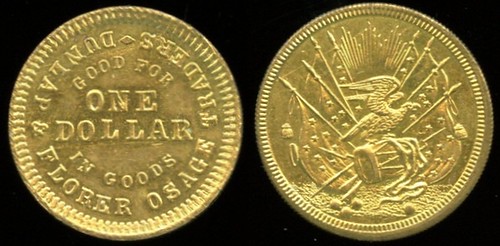
OKLAHOMA / OT / IT - Osage Agency
Lot 466: DUNLAP & FLORER OSAGE TRADERS / GOOD FOR / ONE / DOLLAR / IN GOODS // (eagle, flags, rays, cannon balls), (Osage Agency), br rd 22mm, distance D – S close, reeded
edge. Listed 10 $300. G5-MB$200
Great Oklahoma Territory piece. -Editor
To read the complete lot description, see:
OKLAHOMA / OT / IT - Osage Agency
(https://collector-ca.smugmug.com/Tokens-Exonumia/2020-MAY-MAIL-BID-SALE/i-x6QGL6n)
Lot 541: Hudson's Bay Token
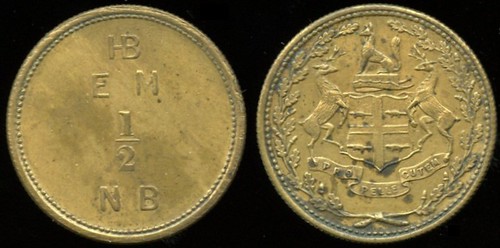
HUDSON'S BAY COMPANY
Lot 541: HB / E M / ½ / NB // (crest of the Hudson's Bay Company), br rd 27mm, reeded edge. G4-MB$250
Hudson's Bay pieces are always of interest. -Editor
To read the complete lot description, see:
HUDSON'S BAY COMPANY Lot 541: HB / E M / ½ / NB
(https://collector-ca.smugmug.com/Tokens-Exonumia/2020-MAY-MAIL-BID-SALE/i-cx2nKfj)
Lot 569: BY. TYLER DETROIT Counterstamp
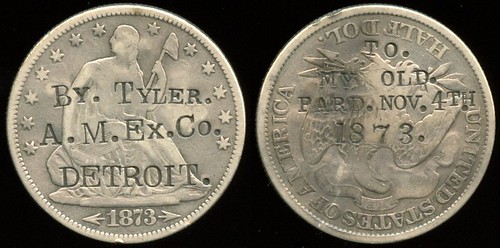
COUNTERSTAMP - Michigan, Detroit
Lot 569: BY. TYLER / A.M. EX. CO. / DETROIT. // To. / My Old. / Pard. Nov. 4th / 1873., (MI), stamped on US half dollar 1873. G3-MB$400
Interesting. But what does the text mean? -Editor
To read the complete lot description, see:
COUNTERSTAMP - Michigan, Detroit Lot 569: BY. TYLER / A.M. EX. CO.
(https://collector-ca.smugmug.com/Tokens-Exonumia/2020-MAY-MAIL-BID-SALE/i-qHvXbc4)
For the complete auction sale, see:
2020 - MAY MAIL BID SALE
(https://collector-ca.smugmug.com/Tokens-Exonumia/2020-MAY-MAIL-BID-SALE/)
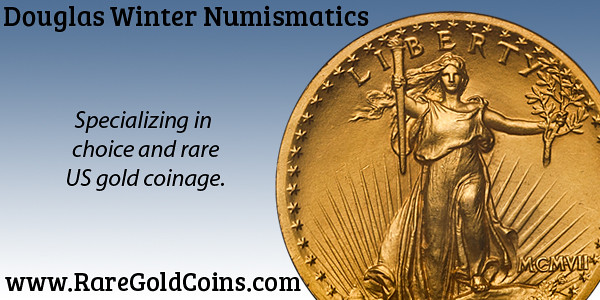
A TETRADRACHM OF QUIETUS
Last week we republished a blog article from dealer Frank Robinson on how he'd restored a group of encrusted German notgeld coins. This article describes his acquisition of a rough Roman coin. -Editor
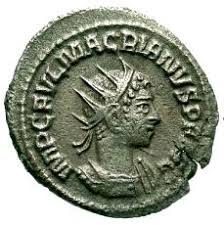 I've written before about the fun of collecting Roman coins. The realm is really so rich, with so many fascinating byways.
I've written before about the fun of collecting Roman coins. The realm is really so rich, with so many fascinating byways.
One is that there are coins of guys who don't appear on the regular list of Emperors. These were "pretenders" or "usurpers" or rebels, typically military commanders who'd make a brief grab at power — typically fatally unsuccessful. One way to cloak themselves with legitimacy was to issue coins with their portraits. Generally of course these are rare, but many are reasonably obtainable.
One such rebel was Macrianus. This was in the "East" (Asia Minor and the Levant); for about a year, 260-261 AD. He didn't actually take the purple himself, but had his two young sons crowned instead — named Quietus and Macrianus Junior. With coins issued for them. Fairly rare, but not prohibitively so.
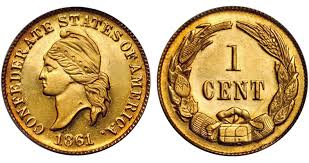 In the early '70s, there were some interesting ads in a coin paper, with an address in Manhattan near where I was doing some regulatory hearings. So I went there, the
guy had a loft, and it turned out he was Robert Bashlow — yes, the one responsible for the well-known 1961 "Bashlow restrikes" of the Confederate cent. He was quite a character
and had tons of intriguing stuff, which I would sort through, during lunch breaks. In one batch of junk I found a rather low grade Roman coin on which I could read the name
"Quietus." This was before I was really much into ancient coins, but I did recognize this as rare, and bought it. (Bashlow tragically died not long after in a Spanish hotel
fire.)
In the early '70s, there were some interesting ads in a coin paper, with an address in Manhattan near where I was doing some regulatory hearings. So I went there, the
guy had a loft, and it turned out he was Robert Bashlow — yes, the one responsible for the well-known 1961 "Bashlow restrikes" of the Confederate cent. He was quite a character
and had tons of intriguing stuff, which I would sort through, during lunch breaks. In one batch of junk I found a rather low grade Roman coin on which I could read the name
"Quietus." This was before I was really much into ancient coins, but I did recognize this as rare, and bought it. (Bashlow tragically died not long after in a Spanish hotel
fire.)
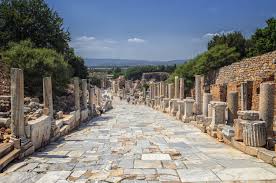 Some decades later, we visited Ephesus, and there were the usual guys hawking fake coins to tourists. I waved them away, but one got the idea I knew coins, and insisted
he could show me good stuff. He led me into the recesses of his shop, and produced a little group carefully wrapped in tissue paper. Most of these were fake too, or else too poor
to be worth anything. But one was a Macrianus! Genuine and in decent condition. He quoted 100 Euros. I said no and walked away, but he followed and continued to dicker. Finally,
on the steps of the tourist bus about to depart, I bought it for 50. I'm not sure if he really knew it was rare. I made some money selling it.
Some decades later, we visited Ephesus, and there were the usual guys hawking fake coins to tourists. I waved them away, but one got the idea I knew coins, and insisted
he could show me good stuff. He led me into the recesses of his shop, and produced a little group carefully wrapped in tissue paper. Most of these were fake too, or else too poor
to be worth anything. But one was a Macrianus! Genuine and in decent condition. He quoted 100 Euros. I said no and walked away, but he followed and continued to dicker. Finally,
on the steps of the tourist bus about to depart, I bought it for 50. I'm not sure if he really knew it was rare. I made some money selling it.
Meantime, for my own collection I'm a real condition snob, and over time have managed to get several types each of Quietus and Macrianus in really excellent preservation. They go for some hundreds.
Those coins are antoniniani, which were the main "workhorse" coins of the Roman Empire in this period. The Romans also controlled Egypt, and the coinage system there was separate and very different. Its principal coin was the tetradrachm. It had started out, in Greek times, as a sizable silver coin, but by the Third Century had diminished to a smaller thick bronze coin (inscribed in Greek). It's a very nice continuous series of coins that ran into the beginning of the 400s; my collection is fairly comprehensive on them.
Macrianus did have control of Egypt for a brief time, so tetradrachms were issued for his two sons. They are rather more rare than the Roman-style antoniniani. I have had a nice Macrianus tet for quite some time, but Quietus seems somewhat tougher, and had eluded me. A definite gap in my collection that begged to be filled.
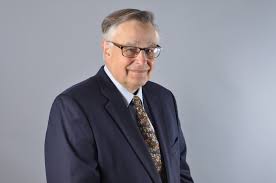 Classical Numismatic Group is a coin firm specializing in ancients, and the biggest such. It was founded by Victor England, a good guy I've known for over 30 years,
always a pleasure to deal with. I visited their Pennsylvania offices, a great place, during our Gettysburg trip; bought from Victor a wonderful lot of 50 late Roman bronzes, in
superb condition — after my careful cleaning. Anyhow, CNG runs frequent internet auctions. I always bid, though it seems pretty futile, as they've built a gigantic clientele, so
coins get bid up high. Still, I persist, on the outside chance of getting something cool. Usually I do snag at least one lot — of no consequence.
Classical Numismatic Group is a coin firm specializing in ancients, and the biggest such. It was founded by Victor England, a good guy I've known for over 30 years,
always a pleasure to deal with. I visited their Pennsylvania offices, a great place, during our Gettysburg trip; bought from Victor a wonderful lot of 50 late Roman bronzes, in
superb condition — after my careful cleaning. Anyhow, CNG runs frequent internet auctions. I always bid, though it seems pretty futile, as they've built a gigantic clientele, so
coins get bid up high. Still, I persist, on the outside chance of getting something cool. Usually I do snag at least one lot — of no consequence.
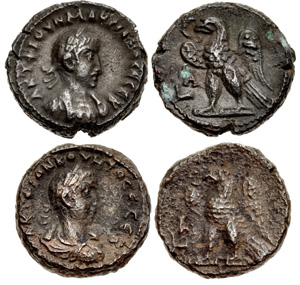 Recently they had a special sale of a large collection focused on coins of the Valerian-Gallienus period — which included Macrianus and Quietus. One lot was a pair of
their Egyptian tetradrachms; the Macrianus fairly nice except for some nasty looking green crust spots on the reverse that I thought I could ameliorate. The Quietus unfortunately
was pretty rough. Well, I got the lot for what I felt was a very good price of $140 (plus 18% buyer fee). So I unleashed my restorative skills on the two coins, and was able to
make the Quietus, if not superb, at least minimally passable for my snobby collection. It does have a good sharp obverse inscription and portrait detail.
Recently they had a special sale of a large collection focused on coins of the Valerian-Gallienus period — which included Macrianus and Quietus. One lot was a pair of
their Egyptian tetradrachms; the Macrianus fairly nice except for some nasty looking green crust spots on the reverse that I thought I could ameliorate. The Quietus unfortunately
was pretty rough. Well, I got the lot for what I felt was a very good price of $140 (plus 18% buyer fee). So I unleashed my restorative skills on the two coins, and was able to
make the Quietus, if not superb, at least minimally passable for my snobby collection. It does have a good sharp obverse inscription and portrait detail.
I've reproduced here CNG's original sale photo, above, with the Quietus being the lower coin; and the same here after my cleaning. I enjoyed adding this to my collection.
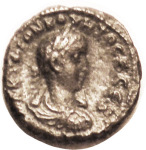
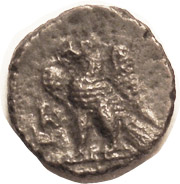
To read the complete article, see:
Numismatic fun: A Quietus Tetradrachm
(https://rationaloptimist.wordpress.com/2020/01/15/numismatic-fun-a-quietus-tetradrachm/)
To read the earlier E-Sylum article, see:
GERMAN NOTGELD COINS (https://www.coinbooks.org/v23/esylum_v23n16a26.html)
HERITAGE TO SELL SALVATION ARMY ANCIENT GOLD
Remember those ancient gold coins dropped in a Tampa Salvation Army bucket last December? They're coming to auction at Heritage. Here's a Tampa Bay Times article found via The Explorator newsletter. -Editor
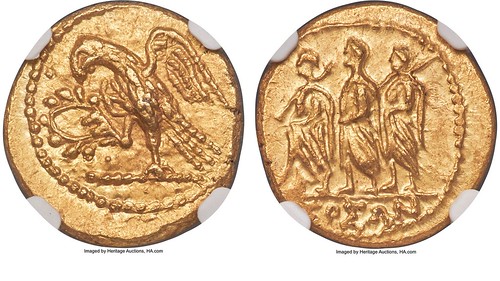
The Salvation Army of Tampa/Hillsborough County brings in around $400,000 annually during its wintertime Red Kettle Campaign, which has the familiar volunteers ringing a bell and collecting money.
This week, they will belatedly add to last year's total.
In December, an anonymous donor dropped two ancient Greek gold coins into a red kettle outside the Publix located near Tampa's Plant High School.
The coins will be auctioned online at 3 p.m. on Friday through the Dallas-based Heritage Auctions. They could bring in thousands of dollars.
It is part of a larger auction featuring thousands of coins from throughout the world and history. But the auction house will not take a commission on the Salvation Army's coins.
"Isn't it amazing?" said Andy Miller, Salvation Army area commander for Hillsborough County. "Whoever made that donation isn't even getting a receipt for it. It is completely anonymous."
The first coin was dropped into the red kettle on December 6.
Six days later, a second identical coin was donated and wrapped in a note that read, "My hope is to continue drawing attention and publicity to such a wonderful organization. The whole country should know about the amazing things the Salvation Army does for their community."
To sign up for The Explorator newsletter, send a blank email message to: explorator+subscribe@groups.io. -Editor
To read the complete article, see:
Two ancient coins
anonymously donated to the Tampa Salvation Army will be auctioned on Friday
(https://www.tampabay.com/news/tampa/2020/04/22/two-ancient-coins-anonymously-donated-to-the-tampa-salvation-army-will-be-auctioned-on-friday/)
To read the earlier E-Sylum articles, see:
LOOSE CHANGE: DECEMBER 8, 2019 : Ancient Gold Coin Dropped in Salvation Army
(https://www.coinbooks.org/v22/esylum_v22n49a24.html)
LOOSE CHANGE: DECEMBER 15, 2019 : Another Salvation Army Kettle Coin
(https://www.coinbooks.org/v22/esylum_v22n50a23.html)
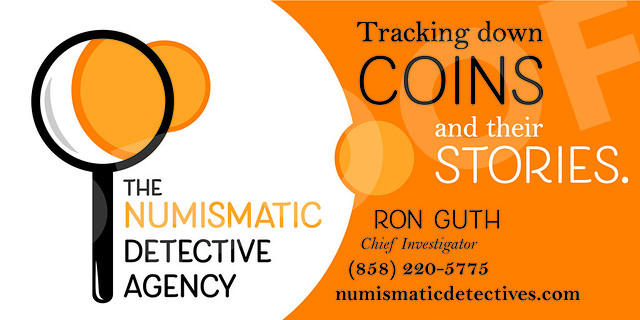
1694 CAROLINA ELEPHANT TOKEN
Alan V Weinberg writes:
"Coattailing on my recent Stacks Bowers "Baltimore" auction review wherein I contrasted a red Unc 1954 cent at almost $20K with a few lots later, a choice Unc 1794 half dime at a few thousand more...
"John Agre of CoinRaritiesOnline appropriately compares his 1694 Ex-JHU/ Garrett elephant / Proprietors colonial token at $49,750 with a recently auctioned Franklin half dollar at more than double that price.
"Again, I say is there something wrong with our numismatic price structure?
"I don't think "supply and demand" covers this. The concocted "Registry Set" ego-based concept does."
Here's the item description. I've highlighted the note Alan refers to in italics. -Editor
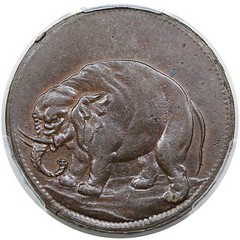
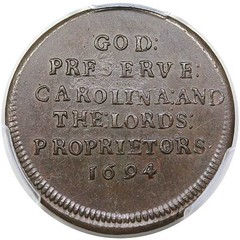
Hodder 2-F, W-12120 variety, with the bold second O over E in PROPRIETORS.
One of our favorite issues, with a charming elephant on the obverse mated to a reverse offering support for the "LORDS PROPRIETORS", the eight members of the English nobility who originally received a charter from King Charles II to establish the colony of Carolina in 1663.
And this is a rare type, estimated by us to be R-5+ with around 40 known in total, but as many as half of those are either impaired or in very low grade. At the other end of the spectrum, our own census research reveals just a couple of uncirculated survivors, the PCGS MS62 BN Ten Eyck-Ford specimen, and this lustrous, chocolate brown piece ex-Garrett long recognized as finest known.
The PCGS pop report is consistent with our findings, with 19 total graded to date, including this piece as POP 1/0, followed by the MS62 coin, with the next highest as AU53 and 13 of the PCGS population in grades of VF or lower.
In all, an amazing opportunity to acquire the finest known example of a rare, desirable and historic colonial issue for less than half the price of a toned Franklin Half Dollar in a recent auction.
Ex Bowers and Ruddy's October 1980 sale of the Garrett Collection, Part III, lot 1316; earlier acquired by John Work Garrett in 1923; earlier the collection of Col. James W. Ellsworth.
To read the complete item listing, see:
1694 Carolina Elephant Finest Known PROPRIETORS
(https://www.coinraritiesonline.com/product/1694-carolina-elephant/)
To read the earlier E-Sylum article, see:
AUCTIONS IN A WORLD OF CORONAVIRUS : PART II (https://www.coinbooks.org/v23/esylum_v23n12a14.html)
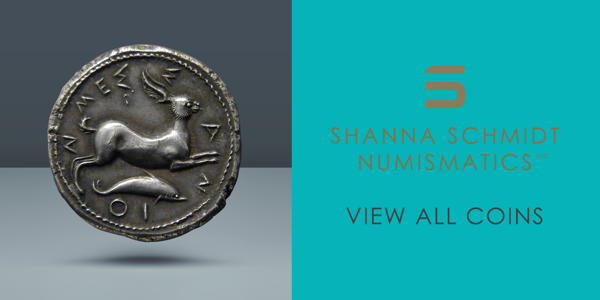
TURKEY AWARDS MEDAL OF INDEPENDENCE
In the better-late-than-never department, Turkey has awarded medals to eight soldiers after 100 years. -Editor
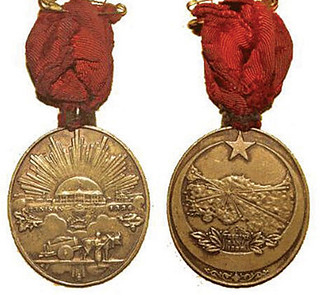 The "Medal of Independence" will be given to eight soldiers who took part in the Turkish War of Independence, which was carried out against the Allied forces that
occupied Anatolia between the years of 1918 and 1922.
The "Medal of Independence" will be given to eight soldiers who took part in the Turkish War of Independence, which was carried out against the Allied forces that
occupied Anatolia between the years of 1918 and 1922.
The decision regarding the awarding of the medals, arriving 100 years later, to the children of the eight soldiers whose service was determined in the war was published in the Official Gazette on April 24.
These medals will be deposited to the children of the soldiers, as the recipients are not alive.
The decision, published under the signature of President Recep Tayyip Erdogan, included a list of soldiers and their heirs.
It is seen that two soldiers lost their lives during the Battle of Inönü against the Greek army and the other died in the Antep Defense against the French Battalion.
By the end of 1922, all foreign forces had left the territories which would collectively become the new Republic of Turkey one year later.
To read the complete article, see:
Medals given to eight soldiers after 100 years
(https://www.hurriyetdailynews.com/medals-given-to-eight-soldiers-after-100-years-154173)
THE BOOK BAZARRE
COPPER HALL OF OSHKOSH, WISCONSIN
Mosaics and other artworks using coins are always fun to see. Here's an event space in Oshkosh that takes its name from a floor paved in coins. -Editor
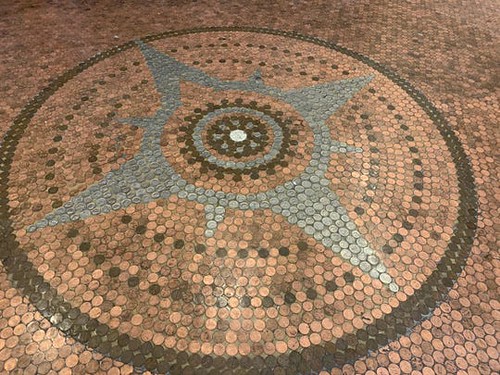
Originally built in 1924, the space opened as Fluor Bros. Construction; in 2014 SonRise Calvary Church moved in before selling the building.
The name Copper Hall comes from the venue's penny floor, which comprises close to 1,500 pennies, Ruetten said. It also features exposed brick and barnwood to give it a homey feel, she said.
The event space will be ready to go once social distancing ends, Ruetten said. People can host any event as long as they clean up after themselves, and people can rent the space for an hour or a whole day, she said.
To read the complete article, see:
Copper Hall: Office space, an event
venue and 1,500 pennies all in one place | Streetwise
(https://www.thenorthwestern.com/story/money/2020/04/24/oshkosh-streetwise-copper-hall-features-office-space-1-500-pennies/3021554001/)
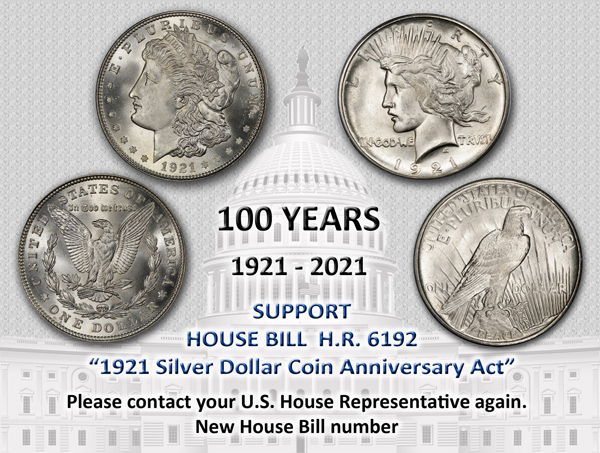
LOOSE CHANGE: APRIL 26, 2020
Here are some additional items in the media this week that may be of interest. -Editor
Warhol Signed Money to Make Money
Here's an excerpt from Blake Gopnik's new biography of Andy Warhol. -Editor
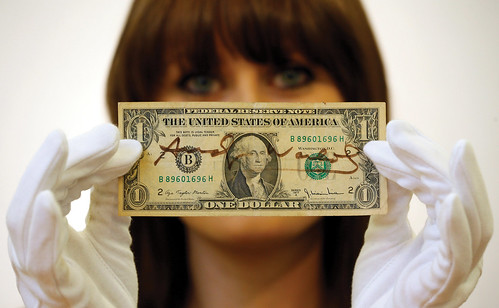
Warhol regularly signed U.S. currency.
This dollar bill sold at Christie's in 2012 for £8,125.
An ad he placed in the Village Voice in 1966 read as follows: "I'll endorse with my name any of the following; clothing AC-DC, cigarettes small, tapes, sound equipment, ROCK N' ROLL RECORDS, anything, film, and film equipment, Food, Helium, Whips, MONEY!! love and kisses ANDY WARHOL, EL 5-9941." Such a public announcement—it used the real Factory phone number—can't only, or mostly, have been a way to truly bring in cash or goods; it proclaimed that, henceforward, selling-out and branded sponsorship would count as signature Warhol moves. Or maybe as his latest art supplies.
To read the complete article, see:
Andy Warhol Offered to Sign Cigarettes, Food, Even Money to
Make Money (https://www.artnews.com/art-news/market/andy-warhol-business-art-blake-gopnik-biography-excerpt-1202684403/)
The Other D-Day
An article by Simon Bytheway published April 21, 2020 on CoinsWeekly examines the leadup and impact of February 15, 1971, the day the centuries-old British system of currency units converted to today's decimal system. -Editor
To read the complete article, see:
The Forgotten D-Day: 10 versus 12 (https://coinsweekly.com/the-forgotten-d-day-10-versus-12/)
Why Do Olympians Bite Their Medals?
This article from Mental Floss addresses the question, "Why Do Olympians Bite Their Medals?" -Editor
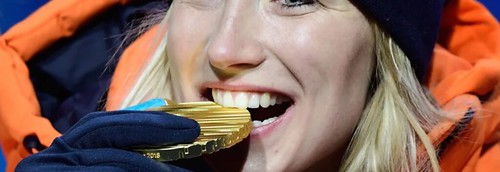
Watch the Olympics and you might notice a number of medalists gnawing on their gold or silver prize like an old-time prospector. Do they believe the International Olympic Committee is going to stiff them? Does anyone expect to bite into chocolate?
It turns out it might be because they're following orders—specifically, the photographer's. When Olympic winners pose for a victory image, a sea of photojournalists are snapping away and asking athletes to do something besides just stand there and smile. With no other props handy, winners have picked up the habit of nibbling on their medal to satisfy the photographic feeding frenzy.
Of course, biting on gold used to be a way to tell if it was genuine (the real thing will show slight bite marks). But most Olympians probably know by now that their gold medal is mostly made up of silver and copper. If they were actually solid gold, the prizes would cost the IOC about $17 million.
To read the complete article, see:
Why Do Olympians Bite Their Medals?
(https://www.mentalfloss.com/article/84550/why-do-olympians-bite-their-medals)
Medal Miniatures
Not all Victoria Cross medals are the same, an Antiques Roadshow guest learned recently. -Editor
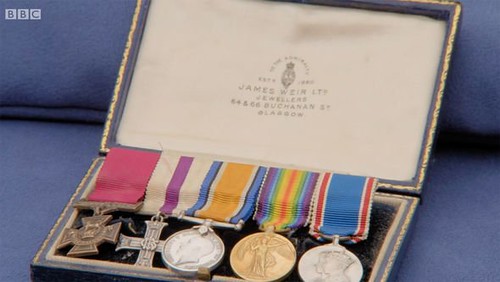
The guest had brought along a selection of pristine war medals from Captain Henry Reynolds, with a personal story behind them.
He told the guest: "It's not often I get to say this but the first medal in this group is a Victoria Cross - what I'm going to have to explain to people is why they're so small.
"What these are known as is miniatures, these are the medals you wear on your mess-dress, or on your evening dress."
"They represent the medals you have won but they are for the evening," with the guest noting: "They're ceremonial."
The guest had shown Mark a photograph of himself wearing his grandfather's Victoria Cross before it had gone to the Royal Scot's museum.
Mark gave them an estimation of £3-4,000, leaving the guest stunned, replying: "Good Lord!"
This wasn't the end of the surprises in store, with Mark confessing: "If it had been the big one? A quarter of a million!"
To read the complete article, see:
Antiques Roadshow guest speechless after war
medals denied £250,000 valuation - here's why (https://www.express.co.uk/showbiz/tv-radio/1272560/antiques-roadshow-medals-250000-Victoria-cross-miniatures-ww1-BBC-video)
LEPER COLONY CURRENCY
This article on the PMG site discusses the coins and paper money of Leper colonies. Here's an excerpt - see the complete article online. -Editor
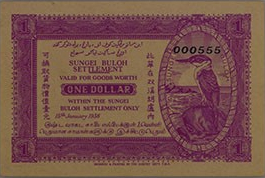
1 Dollar issue from the Sungei Buloh Settlement
Money can do a lot of things, but immunity to an infectious disease is one thing money can't buy. However, if you already have an illness (for example, leprosy), money can help in many ways.
It can be used to buy treatment as well as everyday necessities like food and housing. In cases of infectious disease, where there is fear of transmission, having currency that flows between the infected and uninfected can heighten the risk of transference. One solution to this problem is to issue new currency within the quarantined community. For this month's article, we will be discussing paper money used in certain leper colonies.
Leprosy, also known as Hansen's disease, is an infectious disease that can damage the skin, eyes, respiratory tract and nervous system. Leprosy has affected humans for thousands of years and was once (and still is, in certain parts of the world) considered much more deadly and contagious than it really is. The fear of leprosy eventually led to those who suffered from it being ostracized from their homes and placed in quarantined communities, also called leper colonies.
Scholars today believe that people sent to leper colonies were affected by a broad spectrum of skin conditions. In other words, what was often called leprosy would today be classified as a wide range of different afflictions.
Leper colonies, or leprosoriums, became prevalent during the Middle Ages, especially in Europe and India. They were often administered by monastic orders and sometimes located on islands or up in mountains to make them more remote. In more recent times, in order to further quarantine these communities and prevent spreading the disease, some colonies would issue their own currency.
The first issues of leper colony currency came in the form of coins. The oldest known leprosorium coins were minted in Colombia in 1901. In other parts of the world, paper money was issued either alongside or instead of coins. For instance, scrip notes were issued in 1935 and 1936 at the Sungei Buloh Settlement in modern-day Malaysia.
Like company scrip, the notes issued at Sungei Buloh could be used exclusively for goods and services offered within the settlement or by approved vendors. The notes were issued by the Survey Department of the Federated Malay States. A 5 Cent denomination was first issued in 1935. A second issue was put in circulation the following year that consisted of a 5 Cent, a 10 Cent and a 1 Dollar denomination.
Another leprosorium that issued paper money was on the island of Culion in the Philippines. The Culion Leper Colony was founded in 1902. Initially, special coins were issued, authorized by the Philippine government in 1913. Then, in 1942, the Japanese invasion cut off Culion from Manila, where the coins were minted, and created a lack of currency. In order to buy supplies and pay salaries, an emergency issue of paper money was approved by the president-in-exile, Manuel Quezon. The notes were further backed by the United States Army administration. The Culion paper money was issued in seven denominations: 1, 5, 20 and 50 Centavos, as well as 1, 5 and 20 Pesos.
To read the complete article, see:
The Currency of a Leper Colony
(https://www.pmgnotes.com/news/article/8220/The-Currency-of-a-Leper-Colony/)

BAR PAYS EMPLOYEES WITH SOUVENIR BANKNOTES
A couple weeks ago we discussed a Georgia tourist bar that turned the souvenir banknotes stapled to their walls and ceiling into a payday for their out-of-work employees A bar in Hampton Beach, NH is doing the same. Article found via the SPMC News & Notes newsletter (Volume V, Number 44, April 21, 2020). -Editor
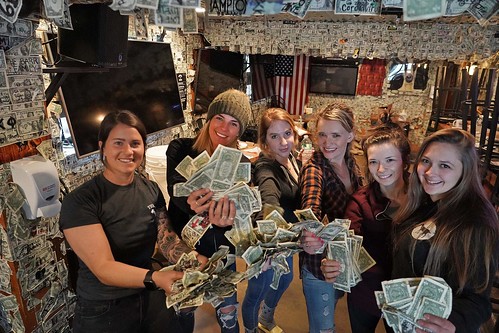
Al Fleury remembers the first dollar bill that went up inside The Goat six years ago. He wrote "Al 2014" and drew a goat in permanent marker to celebrate the opening of his new bar.
"I think it's been covered over four times," said Fleury, who in the last week has worked to pull down all the scribbled-on dollar bills that have been stapled there by patrons. The bills are now being counted and exchanged by Provident Bank, then donated to Fleury's employees who have been laid off due to the coronavirus pandemic.
"I think there's a lot of money there," said Fleury, who also owns Wally's Pub and The Goat in Portsmouth. "It's the right thing to do."
Fleury's bars are still open but currently running on minimal staff to serve takeout to comply with the governor's order banning dine-in service through at least May 4. Fleury announced he would donate the money to his staff in an April 9 Facebook post, offering free burgers and adult frappes for a year to whoever guessed the amount.
Goat manager Larry Scarlotto said there's no way of guessing how much money is on the wall since no one ever kept track. He has been with The Goat since it opened and has always thought the bar should donate the money to a worthy cause at some point. He said there are more than single bills - Sully Erna from Godsmack once came into The Goat after a concert and put up a $100 bill.
"It took on a life of its own," Scarlotto said, adding the hope is for The Goat to have patrons come in and put up more dollar bills to make new memories once restrictions on dine-in service are lifted. Some people have called and requested they keep their special dollar, which Scarlotto said is fine as long as they are willing to donate a replacement.
"You would never think how many are on the wall," said Lizzie Wright, who was working in her second year at The Goat before she got laid off. She has been helping take down the bills with other employees and was surprised to see just how many layers of bills are stapled on top of each other. Some taken down this week offered support in the pandemic. "COVID-19 can't stop us," read one she found.
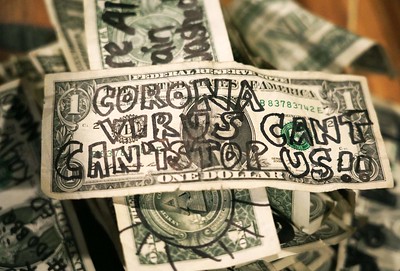
Great numismatic coronavirus collectibles. -Editor
To read the complete article, see:
Hampton Beach bar owner peels cash
from walls, gives it to staff during COVID-19 crisis
(https://www.seacoastonline.com/news/20200416/hampton-beach-bar-owner-peels-cash-from-walls-gives-it-to-staff-during-covid-19-crisis)
To read the earlier E-Sylum article, see:
BAR PAYS EMPLOYEES WITH SOUVENIR BANKNOTES (https://www.coinbooks.org/v23/esylum_v23n15a42.html)
FEATURED WEB SITE: FAKE BULLION DATABASE
This week's Featured Web Site is the Fake Bullion DatabaseThe internet's most comprehensive resource for identifying and avoiding counterfeit bullion.
Browse and search the Fake Bullion Database to view examples of counterfeits. Learn how to test bullion with articles and videos (coming soon) in the Identification section. Read about the bad guys getting caught with Counterfeits in the News and keep up with commentary in the FakeBullion.com Blog.
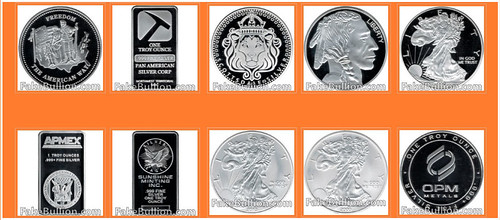
https://www.fakebullion.com/

